#and even when it comes to an end the fundamental question isn’t addressed
Text
A bit more on Heavenly misunderstanding
I’ve already posted about this, but felt like I needed to come back and restate this, hopefully, a bit better.
Aziraphale and Crowley have a fundamental misunderstanding because they do not view Heaven in the same way. Obviously for Crowley, the Fall was transformational. Crowley sees Heaven and God as two separate entities; one unreachable and mysterious, the other drunk on power and lost in petty squabbles and corporate greed. Without that loss, Aziraphale has internalized the concept that God and Heaven are one and therefore the goals of one must be that of the other, theoretically “good”.
If I were doing a literary analysis, I would say that Crowley is representative of our personal relationship with God and spirituality. I’ve heard Hell described as an “absence from God” and for Crowley I believe that is true. Crowley’s trauma from the Fall is more about being rejected by God than being removed from Heaven and doing “good”. He has carved out a reasonably comfortable existence, but he is unable to create, satisfy his curiosity and help those in need. We see that when in crisis he still talks directly to God. In the Job minisode, we see him wistful for the opportunity to ask God a question, to talk to her.
Crowley sees Heaven for what it is, an artificial construct that separates God from the execution of the Plan, ineffable or not. Because of that distinction, Crowley views Heaven as toxic, uncaring and separate from God and “goodness.” He acknowledges the reality that in it’s pursuit of the Plan, Heaven is willing to perform any deed necessary to win. Crowley rejects being reinstated because he doesn’t need a corporate mistake to be fixed or even to be protected from Hell for doing good. He needs to be restored to communication with God and that’s beyond the power of Heaven and is beyond Aziraphale’s fundamental understanding until the end of Season 2.
I have a fundamental belief that Aziraphale is not the angel we believe him to be. I will write more about that later, but suffice it to say he experienced a heavenly trauma that has yet to be revealed, but has left him in the state that we see until the end of Season 2. He has been kept within the confines of the corporate-like structure of Heaven encouraged to bring about the Plan and believe in the ineffable power of “good”. From a literary standpoint, I'd say that Aziraphale represents our relationship with organized religion and society as a whole.
He is encouraged to follow his duties of doing good and thwarting evil, even when they bring him into direct conflict with the Plan and are doomed to failure. He has had the structure, policies and procedures reinforced to him. He struggles with the need for affirmation and approval and turns to the rules and authority for comfort and guidance when it is lacking from his superiors. He has been repeatedly told he is not enough.
He functions on faith. It’s mainly faith in the system. Aziraphale has faith in God and the ineffable Plan, whatever that may be, but he relies on the system. And for him, the system is Heaven and God working as one. "The Almighty" isn't as personal a concept for him. His first response to crisis or a lack of guidance isn’t to directly address God, even if he knows that she's ultimately running the show. He appeals to a higher authority within the Heaven’s structure.
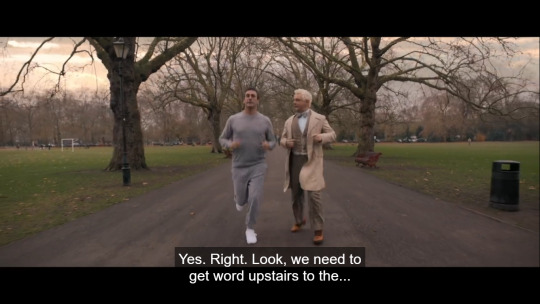
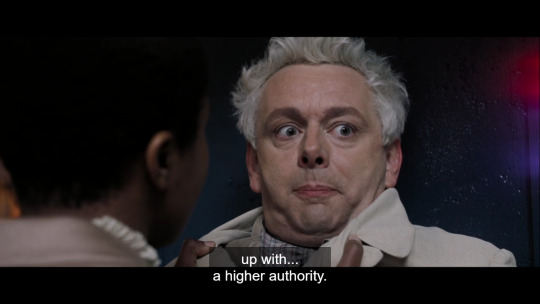
In Season 1 he does try to reach God, but settles for the Metatron, an intercessor.
In every case, Aziraphale allows himself to believe that he is the one at fault, surely the system, Heaven, couldn’t be wrong. Sadly, I don't think that Aziraphale ever experiences a personal relationship, ever. I think that lack makes the ineffable plan an esoteric concept that he feels he should aspire to, even if he doesn't really get it, much like a corporate mission statement. He has been gas-lit and bullied, degraded and demeaned until his innate response is to believe that it’s him.
Aziraphale will never be able to understand how Crowley views God and heaven until he goes to heaven and sees the disconnect for himself. Not just see the disconnect, but see that he is powerless to make a change. He’s the little engine that could. Aziraphale needs to see that far greater than him cannot stop the power of Heaven. He has to see that Heaven is a machine that has corrupted goodness and possibly the will of God. Then he has the foundation to understand why.
7 notes
·
View notes
Text
On Mai and the cracks in her facade with Azula
Hello lovely Maikos and Mai enjoyers! Today I saw a post come up in my dash about Mai and her fear of Azula - which seems to be quite a contentious topic in the tags I search.
Fundamentally I agree with one poster that said: Mai might not be necessarily afraid of Azula, but Azula exerts fear and manipulation to control her and Ty Lee. There is a distinction between the two - especially considering the power dynamic between Princess Azula and her friends who essentially act as minions. And Mai knows that she must comply with Azula’s orders otherwise she will face the consequences. The consequences being death at worst or spending the rest of your life rotting away in prison at best. Whether this is due to Azula’s position or an outcome of betraying the ruler (or to be ruler) of the fire nation - the consequences remain the same.
Which is why I don’t understand the argument that because Mai wasn’t afraid of Azula - her line and her actions in the Boiling Rock don’t have much weight. Because when she says “I love Zuko more than I fear you” this is directly after Azula says “My question is why? Why would you do this? You know the consequences. So Mai, despite knowing that betraying Azula means death or life in prison - chooses to do so out of her love of Zuko. Mai’s character arc is partially about overcoming her fear from Azula or abuse from her parents, (although I don’t understand why it’s so contentious). But It’s also overcoming her apathy and her willingness to let someone choose decide her fate for her.
I’m not that much of a wordsmith so I will quote from this author’s brilliant meta on what that means:
Mai decides that who she loves is more important than what Azula wants. Ty Lee decides that what she wants, for Mai to be safe, is more important than what Azula wants. These two spent most of the series under Azula’s thumb, having their insecurities and fatal flaws exploited and pushed to do things they didn’t want to do to make Azula happy. But they overcame their internal struggles and get to chose love in the end. -nothing-more-than-hot-leaf-juice
And she was willing to die for that. But the point of todays meta is to address a post that came up in my dashboard:
i’ve seen the argument that mai only dares to do this when azula isn’t around, but then why doesn’t she exercise this agency in other cases where azula can’t see what she’s doing? why not show a flicker of worry for her brother when fighting katara and sokka (while azula is occupied with aang)? why not look down, momentarily tensed, when ty lee teases her about zuko, and azula isn’t even looking in her direction? why not show compassion for the people of ba sing se?
if mai is apathetic and repressed as a result of trauma, or she’s putting it on due to a fear of azula, then show us that this is her response, and not the real her. show us the cracks in the facade. show us the choices she makes when she has the freedom to choose. -burstofiridescent
And what better than to demonstrate this visually?
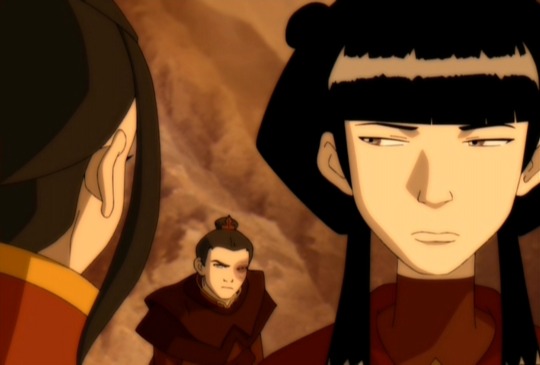
Mai showing that even though she is following Azula’s orders - she does not agree with this and is forced to oblige Azula in leaving Zuko while they are on their date.

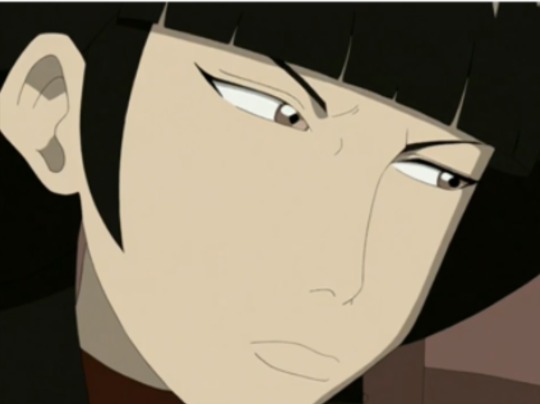
Mai showing that she’s visibly upset and uncomfortable with the trade - she isn’t happily complying with Azula’s orders about her baby brother. She’s even shown as angry - but is forced to listen to Azula, which is why she conspicuously uses “Princess Azula” - referring to her title for the first time. But of course, Azula doesn’t notice this.
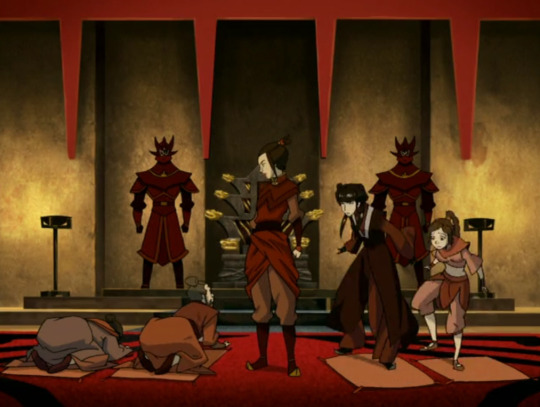
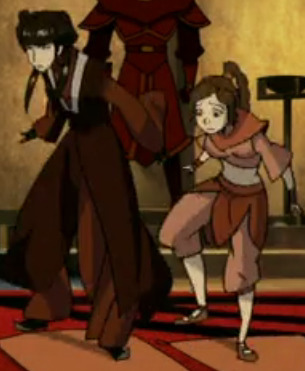
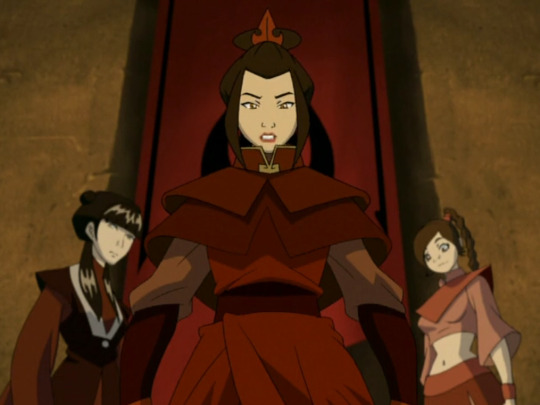
Mai and Ty Lee when they first hear about the hostage situation. As you can see, “Mai’s usually stoic face has turned into a frown. Ty Lee, expresses visible concern that her friend is going to lead a dangerous transaction” -avatarsymbolism
A brilliant example of a crack in Mai’s facade. And a couple more things - when Mai doesn’t follow Azula’s orders - when Azula isn’t there - it still doesn’t mean she’s not afraid of the consequences of someone telling Azula what happened. But remember that Ty Lee is the only other person to witness Mai’s acts of defiance. And Mai knows Ty Lee wouldn’t tell Azula. Her fear of Azula doesn’t outweigh betraying her friend.And Ty Lee and Mai have been proven to be friends. They trust each other and bond over companionship whilst being bound to Azula. Which is why it’s so much more poignant when both Mai and Ty Lee finally take a stand against Azula.
The only other time where Mai defies Azula is at the Beach - where everyone was emotionally vulnerable but also Zuko is there.
The point of this meta isn’t to make an explicit judgment about whether or not Mai was truly afraid of Azula herself. But Mai is definitely shown complying to Azula’s wishes out of a fear and acknowledgment of the consequences of betraying her.
We truly do see Mai’s apathy being established as an outcome her relationship with her parents and Azula. The real Mai, the cracks in the facade, are shown throughout the cartoon in small but poignant ways. She sees how Mai acts when she is outside of Azula’s clutches and the only person to witness it is her actual friend Ty Lee. Apathy and repressing herself are coping mechanisms Mai had to adopt.
And while mai wasn’t forced into joining Azula because let’s face it she was bored and needed an escape from Omashu - she knew of the consequences of backing out/failing to comply with Azula’s wishes once she had joined. Azula demonstrates the additional leverage she has over Mai by making her focal to the hostage situation. That Mai’s needs are always below Azula’s wants. But there is a tangible distinction between how Mai acts on her own volition and how Mai acts when she’s in Azula’s presence and has to oblige her wishes.
Thank you @warriorfaeriequeen for inspiring this!
#mai#zuko#avatar the last airbender#atla maiko#pro maiko#atla#indefenseofmaiandmaiko#maiko#maikoforeverbitches#anti zutara
36 notes
·
View notes
Text
Offer me your name at my altar
A/N: Time for my annual Bartseq post about the bastards aka read as my scrambled brain is clinically insane for 3k words and then collapses so I can go back into the void until I'll appear again next year.
Pairing: Khaba x Ammet (big surprise)
Description: Fluff mixed with angst and more fluff. And some more angst because I can't let them be happy.
Warnings: It's heavily implied that they did some rather unholy things off screen but there are no real descriptions of it, mentions of death if you squint. If you see any spelling errors no you didn't. Also please be aware of the feral octopus @shadowy-dumbo-octopus
Story under the cut!
There is something fundamentally different in the way Khaba calls out Ammet’s name.
First and foremost, there is the obvious part. If somebody overheard Khaba mentioning Ammet’s name in passing conversation, they would assume he is a friend, possibly a lover.
Now, knowing Khaba the cruel and the fact that he wouldn’t utter Ammet’s name anywhere where it would be possible for people to overhear him, one would have to be eavesdropping on the sorcerer which isn’t a very good idea with sorcerers in general, and even less if the magician in question is named „the cruel“.
So even if some unfortunate spirit overheard a certain name leave Khaba’s lips, there wouldn’t be any opportunity for them to think the underlying tone in which the name is uttered, considering the usual lifespan of a spirit that decides to poke their nose in Khaba’s business is not a long or particularly joyful one.
The countless spirits of varying ranks which are currently suffering in neatly arranged rows of essence cages are more than enough proof of said sorceres short temper when it comes to eavesdroppers, not to mention the unexplainable illnesses that usually take hold of whoever was ludicrous enough to send their spirits to Khaba with the intention of working out some plot against him.
Not one single soul, spirit or sorcerer alike would have ever guessed that Khaba was referring to a spirit, and Ammet was gleefully aware of that. If his master whispered his name, it was without the malice that usually distinguished the way sorceres addressed the spirits, their slaves.
Ammet was different from the other spirits that were unfortunate enough to work under Khaba. There was no open distaste dripping from the sorcerer’s lips as he talked to him, no barked orders that made the poor spirit on the receiving end remember their position as a slave with each hissed word. No, not when Khaba was speaking to Ammet. Never when he was speaking to Ammet. If his name danced on Khaba’s tongue, there was something that reached far deeper than a spoken word should be able to.
Every magician, alive or long dead, was very aware of the power a spirit’s name had over the creature. It was the usage of their true name that allowed them to call spirits into their realm, to force them into a physical form and to bind them to the orders that were given to them, giving them the choice between cooperating with said orders or having to endure severe punishments if the unfortunate spirit in question messed up. In that way, a spirit’s name was everything they really had, and so it comes to no surprise that spirits usually kept their name as secret as it was possible to avoid any further enslavement.
Ammet, however, couldn’t help but to think that even if his master wouldn’t have been the one to summon him, he would have given Khaba his name anyway. Hell, he would have offered his name on a silver platter, even if the silver burned his essence to bits and pieces. He’d gladly choose this human time and time again for the rest of eternity, no matter the fact that staying on earth too long would irreversibly damage his essence and make him go mad with pain. No matter the price, he would stop at nothing if it meant that he would be able to serve Khaba just for a few heartbeats longer.
How could he resist, really? When Khaba spoke his name, it wasn’t as if the sorcerer was talking to another human either, No, the soft whisper that left Khaba’s lips was something that only Ammet has been privy to, for no other creature on this earth could compare with the soft call of Khaba’s voice.
Every syllable that left Khaba’s lips as he muttered Ammet’s name was something akin to a prayer, filled with adoration as every letter sinks into his skin like a psalm offered by a devotee to their beloved god. They leave Ammet helpless in a way that he has never felt before, not even when compared to all his experiences that he gathered during his long time of serving different masters on this wretched planet.
Ammet, as a marid and therefore more akin to water as an element, was used to the dark depths of the oceans and whatever horrors lurked within. But Khaba’s words were molten silver, banishing the cold and burning their mark into Ammet’s essence.
Sometimes, Ammet couldn’t help but to feel as if every single one of Khaba’s words was slowly dissecting him, cutting with a sharp blade and gentle hands all the way through his essence until he would lay fully bare in front of the human, no disguises to cover his form. Just Khaba and him.
And as thrilling as it was, as hard as Ammet had to fight against each of his deeply ingrained survival instincts that screamed at him to get up, to rip our the scalpel from his essence and fight back against whatever made him feel so vulnerable and exposed, he felt strangely at peace when the touch of molten silver caressed his form and hands that were stained black by his essence brushed so gently against his form. In a way unknown to him, despite being eons old, he wished for the burning touch as soon as the feeling left his body.
If given the opportunity, he would reach for the silver scalpel himself, just to peel his outer layer fully apart and offer Khaba what he had never offered any other create before. He would rip and tear through however many layers of his essence it would take just to hear Khaba calling his name again, and to offer the sorcerer what he had difficulty to put into words.
This is me, with no disguises to shield me, with no lies to keep myself save from the cruelty I have experienced from your kind before. I am yours. Call my name again, for it already belongs to you. I belong to you.
In return, there is something fundamentally different in the way Ammet calls Khaba’s name, too.
As unusual it is for a spirit to be addressed by their master with anything else than cold dismissal or seething hatered, the fact that Ammet calls his master by his first name borders on nothing short of bizarre from a more traditional standpoint. Even if it isn’t Khaba’s birth name that Ammet is calling, it still breaks almost every single rule that usually keeps the spirit at bay.
No self-respecting slave should call out a masters name like Ammet calls out for Khaba. Especially not if said slave was forced into a realm to follow orders against their will. And no self-respecting master would ever let their name be called in such a matter. Not when Ammet whispers his master’s name against the sorcerer’s lips in a tone filled with adoration, devotion and wonder.
For Ammet, it’s like tasting the sweetest forbidden fruit any garden could ever have to offer, knowing full well that you will never able to enjoy any other fruit because the juices if the forbidden one have caressed and stained your tongue with the first bite, making any other taste pale and dull in comparison.
The only thing that slightly mellows the sweet taste is the fact that Khaba is unable to offer Ammet his birth name - long forgotten by years of intensive sorcerer training back when Khaba lived in egypt, as a young boy. With each step that Khaba took forwards the memory of his birth name slipped further from his grasp, until it was no more than a dull, murky shadow that could not be remembered, even if Khaba would have tried to do so.
And gods, he had tried. He would offer Ammet his real name without any second thought, knowing full well that he was playing with fire. Letting a spirit know your real name is akin to a death sentence for sorcerers, but Khaba cared little for this fact. If given the opportunity to remember his first name, Khaba’s very first instinct would be to whisper it against the marid’s lips, only of his ears to hear. He would offer up his own name to the creature in front of him within a heartbeat. And Ammet is more than aware of this.
Still, even if he is unable to call his beloved by his first name, the marid isn’t one to complain about little details. Not when Khaba, his dear master would so sweetly offer him anything he is without a second thought. And this fills Ammet with glee. It encourages him even more to gently whisper the name of his human, in rooms where there is nobody present but the two of them and Ammet has the opportunity to taste each letter on his tongue, to sample and enjoy every single one of them like a fine wine.
He can tell that Khaba enjoys this too, when he observes the way the sorcerer smiles when looking at him. Moments like these make yearn for a world where he can have Khaba all to his own, where there is nothing else to think about than the sweet taste of his masters name on his lips.
The reality, unfortunately, looks nothing like that. Even if Ammet follows his master around every step he takes, watching over the sorcerer from his disguise as the mans shadow himself, Ammet has to be careful. Other magicians, especially the other ones of Solomons 17 are always looking for a way to get rid of competition, as Ammet has had seen countless times with magicians. This time, however, it was different.
Not once has he ever felt as much anger as the first time he had overheard one particularly gruesome plot to get rid of his beloved master. Not once in his eons of existence and serving other magicians had the mention of a name elected such an aggressive response out of the marid - the spirits who were chosen to be send out to injure his master were ripped to shreds before they came even close to catching one glimpse of the tower in which Khaba resided in.
Even hours later, in his masters personal chambers far away from anything that could hurt him, Ammet was restless.
„They said your name“ he had whispered, claws digging into flesh as he pulled Khaba impossibly closer to him. „They said what only I should be allowed to say. Trying to take away what was mine“. And Khaba had done nothing but to chuckle and placed a hand on the marid’s claws, keeping them there despite the wounds that were already forming, despite the blood that was running down the sides and staining Ammet’s form.
„They may have said my name, they may have had the intention to hurt me“, Khaba had said, his voice low and gentle, yet slightly amused. „But as you can see, I am in the best hands. You would keep me save, wouldn’t you? Why would I need to worry about trivial matters as these, my dear Ammet“ - one of the magicians hands had brushed over the back of Ammet’s hands, gently. Way too gentle to be directed at a creature like him, but Khaba continued anyways. „Let them say my name. I could not care less.“ Khaba locked eyes with Ammet that moment, his voice a low purr.
„There is only one person that I could care about when they say my name, and that would be you. You should know this. Others may speak my name, but it only holds worth to me if it comes from your lips. Nobody else.“
You offer me your name in return, like the sweetest sacrifice a devotee could ever offer their god. You place it down on an altar dedicated to me and smile as I dig my fangs into your skin. You are mine in return. Your name only holds significance if it falls from my lips, because there is nobody on this earth who you belong to more than me. You are mine.
But there are days when simply calling the name of his beloved isn’t enough. Days on which Ammet suddenly is served a painful reminder that his lover is mortal - easily fragile when compared to him.
One day, he knows, Khaba will call out his name for the last time. And now matter how loud Ammet screams out, he will never get an answer in return.
On days like these, he kisses Khaba like he wishes to devour him whole. The promises spilling from Khaba’s lips are sweet poison and Ammet laps up every single drop before diving in for more. „I’m right here“, Khaba whispers. „I’ll stay with you. Right here. You have me.“
The words leave stains on Ammet’s tongue, on his claws, on his essence. In response, he grabs Khaba tighter and digs his claws into his skin. Ammet wishes for nothing more than to carve his name into the humans flesh, over and over again, as Khaba’s words burn into him like molten silver and brand the marid in return. Until there is nothing left of the both of them but the whispers of each other’s names that they share between kisses. Until his eyes can only see Khaba, and nothing else. Not as if anything else would really matter to him in the first place.
This is the way Ammet has decided to cope with the gnawing feeling of emptiness that threatens to consume him, overwhelmed by feelings most creatures of his kind won’t experience and deeply fearful of the day on which Khaba will be forced to leave him behind.
But there is no time for such musings right now, not when Khaba calls his name so sweetly, breathless and with fingers digging into Ammets skin to ground himself.
There is no time for Ammet to delve into the deep waters of what will happen to the both of them once Khaba is gone, not when a touch of molten silver grazes against his skin and sets his whole being alight. Not when every breath Khaba takes breathes fresh air into Ammet’s lungs aswell.
How foolish Ammet would have to be to focus on anything else but right now, when Khaba smiles at him with a droplet of blood running down his lips, where Ammet’s sharp teeth broke skin during their frenzied kissing.
„I want your eyes on me“, the marid murmurs, tracing the twin scars on the magician’s face ever so gently despite his strength. „Nobody else but me shall ever have you“.
And Khaba smiles, leaning into his touch. Eyes tracing the creature in front of him like he is looking at the finest work of art ever created. „And you have me“.
Ammet’s hands grasp at the magician in front of him in a way unusual for a spirit like him. He holds the human as if digging his claws into his skin ensures that Khaba will never leave again, like every kiss against his lips is a promise.
„You have me in return“, Ammet’s actions scream, even if he isn’t uttering a single tone. Not that he needed to. Khaba knows his lover well enough to be aware of what his actions mean. The bruises on his skin will serve as a sweet reminder of his marid’s devotion, and Khaba carries them with pride.
He knows that he’ll use them to rile Ammet up later, when the sorcerer intentionally brushes against them over the fabric of his robes, knowing fully what lies underneath and seeing the edges of his shadow glimmer just a bit too much for an actual human shadow as his lover tries his hardest to compose himself.
Khaba is fully aware that his lifespan as a human is significantly lower than the span of his beloved, and knowing that someday, someone else will call his marid’s name and force him to carry out orders simply makes Khaba press against Ammet even harder, as if trying to merge their bodies into one.
Knowing that he alone will be the only one that Ammet has ever desired and adored, hoping that he will be able to leave a mark on Ammet’s essence so that the marid will carry a piece of him forever.
A few hours later, as they lay in bed exhausted and simply basking in each others presence, Khaba brushes his hands over Ammet, deep in thought. „Nothing will ever able to compare to this. Not in this lifetime or in any other“, he muses against the marid’s form. The fact that any lifetime without Ammet by his side would be worthless to him remains unspoken, but Ammet understands the implications anyways and it earns Khaba a quiet chuckle in return.
„As long as I am here you won’t have to worry about these things. Not that anything would have a chance to compare with me in the fist place, dear master“, Ammet murmurs, and Khaba almost consideres smacking him with a pillow to wipe the smug smile off his face, but tender moments like these are hard to come by and to ruin this one out of pride would be a waste. Instead, he rolls his eyes and pulls Ammet closer.
Truth be told, he barely cares about what will await him in the afterlife. Whatever it is, Ammet is worth it. And should he be punished for loving the marid, then so be it. He doesn’t wish for salvation.
Why should he care about the opinion of whatever god may judge him after he passes in the first place? No, their judgement means nothing to him. Not when the creature snuggled soundly into his side is the only thing in this world that Khaba deems as truly divine.
When I speak your name it leaves stains on my lips, my skin and my soul. You deem them beautiful. I kiss the marks I have left on you in return. Nothing that we’ll ever experience will be able to compare with the way your voice claws at my body as you speak my name as answer to my whispers. I offer my name and everything I am to you and you accept and offer me your name in exchange.
5 notes
·
View notes
Text
Online Trading In The Stock Market Today.
Online Trading In The Stock Market Today. Today, thanks to the internet, online trading in the stock market is open to pretty much anyone with the cash to invest and access to the internet. With this newfound capability for even the typical individual to get involved in the stock market comes both advantages and disadvantages. In this short article, I will review a few of the benefits and drawbacks in addition to some ideas of what you can do to ensure you are protected from making expensive monetary errors when you get involved with online trading in the stock market. PROS: Easy gain access to 24/7. Even though the stock market isn't trading around the clock, you will have access to numerous of the tools and resources of an online trading platform. The ability to make trades for an extremely small commission. This can assist the little financier who is simply getting started. CONS: 1. There are different trading platforms provided by the online brokerage homes, some of them are more complex than others. Although they claim to be easy to use some people might still have problems figuring all of it out. It depends upon the private and how comfortable they are with knowing in basic and innovation in particular. 2. It might sound ridiculous however it can be easy to forget that you are dealing with real cash. In cyber land, it's easy to start considering everything as just "digital". If you forget the reality that you are handling real money you might simply end up taking gambles you wouldn't generally take. While I always advocate finding out all you can about being a partner and investing with your broker, there will be times when you have concerns. If you do not have anybody to turn to for the responses you need you might end up making a bad decision. None of these things are overwhelming obstacles and they can be quickly overcome if you want to invest the time. Here are a few things you can do to turn these cons around: 1. Before you register for any brokerage account, spend some time and discover the fundamentals of investing. If you don't understand any much better, even the worst suggestions in the world may sound excellent to you. 2. If you aren't especially good at all things innovation-related, find an online brokerage that uses a complete strategy. That way you can have someone available to address any concerns you may have associated with investing or simply how to use their software. 3. Carefully compare a few different online sites to determine which one works finest for you. Do not simply go with the most affordable costs for making trades. Think about other elements like the trading platform they utilize and whether it is a complete brokerage or a discount brokerage (which normally suggests a lot less assistance will be available if you have questions). As long as you do your part and do your research, online trading in the stock market can be an excellent way for you to take more control over your finances. Just do not ever enter blind, inform yourself initially and you will increase the odds of making more money. Even though the stock market isn't trading around the clock, you will have access to many of the tools and resources of an online trading platform. There are different trading platforms offered by online brokerage houses, and some of them are more complicated than others. If you aren't especially great at all things innovation-related, discover an online brokerage that provides a complete service plan. Thoroughly compare a couple of different online websites to figure out which one works finest for you. Think about other elements like the trading platform they utilize and whether or not it is a complete service brokerage or a discount rate brokerage (which usually indicates a lot less assistance will be readily available if you have concerns). It's a great time to start! an introducing broker: https://live.4xc.com/signup/FG4aG6qb Ian Jackson.
#Forex Trading#FX trader#how to trade forex#learn to trade#how much money can I make trading forex#options trading#how to trade bitcoin#knowledge to action#how much money do I need to trade forex#is trading a scam#financial freedom#earn money online#Money#Trading for beginners#how to trade basics#free trading course
0 notes
Text
Is Culture Actually Dead?
WARNING: Don’t assume you know where I’m going with this until the end. This is a LONG fucking read not because I’m ranting but because I’ve thought a lot about the title question and wrote this almost as a stream of consciousness as I worked out what my opinions actually were. And yes, I know the title is super fucking loaded, but again: DON’T ASSUME THAT MEANS ANYTHING. It’s literally just the question I’m debating with myself.
I frequently describe western culture as ‘dying’ because most of the media that defines it is no longer made to fulfil a genuine creative vision or explore an idea but to either a) earn lots of money, b) manage a soulless corporation’s image by hastily applying a by-the-numbers coat of faux-progressive paint, c) ensure that a property aforesaid corporation acquired awhile ago doesn’t accidentally slide into public ownership or d) some spirit-crushingly awful combination of all of the above. However, I recently found an article that’s even more pessimistic about the state of culture than I am. Apparently, culture’s not just dying- it’s dead. Well, it would certainly explain the smell.
The article I’m talking about- actually a few different articles, now that I think about it- make the point that a thriving culture is fundamentally antithetical to democracy as we currently understand it. If anyone can declare anything to be either a work of genius or a travesty then there’s no longer any meaningful metric by which to evaluate cultural output and no way to sift that which is worth preserving from the background noise. You no longer have to know things or have practised analytical skills or a deeper, intertextual understanding of cultural works that have gone before to set yourself up as a pundit or media analyst. Thanks to the internet, all you need is a web address and the ability to attract eyeballs.
Now, on one level, this isn’t a bad thing. Case in point: me! I’m not a member of the social elite, but I’m still able to publish pieces, such as this one, that anyone can find and read. I belong to a class of people without money or resources but with genuine passion and a desire to provide meaningful analysis (but also dick jokes, because I never claimed to be emotionally mature- just intellectually superior). Likewise, some of my favourite analyses and pieces of cultural commentary from the last twenty years have come from pundits who essentially created themselves from a base of nothing with nothing but a sincere interest in their subject matter and a relatively nuanced take on the society that produced it.
Unfortunately such people are not the rule, nor do they command the greatest degree of public attention. Most of the people who shape our perception of our cultural milieu and help some things succeed while others fail are- and I’m being as polite as I can here- cunts. And when I say ‘cunts’ I mean… well, I mean ‘cunts’, but I also mean ‘bad actors’: people who are motivated by a desire to keep themselves relevant and guarantee that others see them in a positive light. You can’t honestly analyse a piece of media if you’re worrying that your readers or viewers are going to call you a racist or sexist for shitting all over the latest Star Wars abortion or a ‘libtard’ for pointing out that maybe ageing bigot Clint Eastwood should just fucking retire and stop having anything to do with movies. And that’s a problem, because it means that nobody holds garbage to account for being garbage. In fact, quite a lot of people will actively defend it because it reflects the ideologies of their assumed audience, whatever those may be. Of course, good stuff is also praised and tiptoed around in the same way, but garbage is easier to produce than good stuff. In any system where trash is afforded the same level of attention and adoration as actual works of meaning, the trash will very quickly come to dominate the cultural landscape, because there’s no incentive to put in the work to produce the other kind of media. At which point you no longer have a cultural landscape, but just a big, reeking dumpsite full of ‘content’- endlessly disposable; endlessly regurgitated; and endlessly self-congratulatory because nobody’s ever taken its fucking talentless creators aside, slapped them, and told them to piss off to Reality TV where they belong.
But thinking about the claim that culture is dead, I was astonished to realise I don’t actually agree. Yeah- when I saw the title of the article, I thought “crikey! This looks like it’s going to reflect my opinion on the state of the world!” but, because I was being prompted to think about the issue in more depth, I ended up concluding that I think something slightly different.
You see, most media has always been twattish. It’s made by twats, for twats and of twats. Okay, not usually ‘of twats’, but I needed an extra thing to round out the Rule of Three. I think the current level of paucity only feels more egregious than usual because we had a few really good years at very beginning of the current century. Not that everything made in that time was high culture, you understand (fuckity no it most certainly was not) but there was a kind of goofy sincerity to it that was easy to find admirable. To use the distinction made by everyone’s favourite cartoon about an alcoholic scientist, it was joyful rather than joyless. While this doesn’t really have anything to do with the actual decline of meaningful culture (enjoyable isn’t the same as spiritually and intellectually enriching after all- if it was, we could all wank our way to enlightenment), it does mean that the decline has felt more acute than it really is. The truth is that if you want to encounter genuinely enriching culture rather than content, you’ve always had to go the margins. The truest books are the ones that get banned or suppressed on the grounds of perceived salaciousness. The most stirring pieces of music are rarely heard outside of small venues and the CD collections of obsessive nutters. The best films and telly appear randomly on the budget fringes and then sink into obscurity because they couldn’t find a large enough audience. It’s always been thus. Bemoaning the proliferation of Dan Brown clones and bad romances on our bookshelves is fun and at least represents an attempt to hold trash-pedlars to account. Pointing out that The Rings of Power has the writing chops of a four year old with a crayon up his nose is certainly a worthwhile critical endeavour. But these abominations aren’t new. They’re the default- we were just allowed to forget that for about ten years at the start of the century. These are, after all, mainstream things and culture has always been the preserve of a relatively small number of people. I don’t mean the conventional ‘elites’ of academia and the economy either. The small number of people I refer to are those charmed and cursed few who are mentally ill enough to get inspired but functional enough to do something with that inspiration. Hi, by the way.
I’m not saying things aren’t bad. True culture has always been thin on the ground, but popular culture is in a more worryingly aberrant situation. A single company dominates almost all of it. Even its largest competitors are judged by the metric set by that company. And that company is a creatively bankrupt, bloated fuckstorm that may still be using slave labour to make its merch (it’s suspiciously hard to confirm, as I’ve noted before). So yes. Things are very, very bad. But they’re not irremediably bad. The margins are still where they’ve always been, waiting to shelter poor fucks like you and I from the aforesaid fuckstorm. I mean, I’m about to be a published author, so things can’t be going that badly. Right? Right? Never mind.
I also read another article recently that made a different argument regarding the death of western culture. This article said that our culture was effectively dead because we no loner connect to anything larger than ourselves- not our past; not our ceremonies or rites; not our shared narrative about who we are. We have, apparently, become ‘uprooted’. The polyphony of freedoms we enjoy is a double-edged sword that has unmoored us. We still have a sense of self, but its cobbled together from whatever bits and pieces we can find lying around rather than built on a solid foundation. I’m… wary of this argument. It’s too easy for right-wing madmen and charlatans to co-opt. The moment you start talking about a loss of roots, you get some frothing-mouthed neocon lunatic jumping up and down with excitement ready to blame our disconnection from our roots on whatever the scape-goat du jour is. Usually immigrants, because right-wingers are not overly endowed in the imagination department. Just look at their conspiracy theories- they’re boring shit about the Earth being flat (and therefore less interesting than it really is) and imaginary paedophile rings. For the purposes of contrast, consider the conspiracy theories of genuine apolitical, certified tinfoil-wearers. Those kooks get to believe in giants living in the hollow core of the Earth and shape-shifting lizards who have coopted entire monarchies! But I digress.
Wait, what was I talking about? Oh yeah: is western culture dead because we’ve become ‘uprooted’? Well, if we can set aside the racists and xenophobes who want to make the issue of ‘uprooting’ a dog-whistle for a moment, the answer is… complicated. Certainly, a shared sense of communal identity helps to sustain a healthy culture. Even though the past was horrible and only usually survived by people who did horrible things, understanding its relationship to you also allows you a sense of continuity. To be part of a narrative that is greater than yourself fills a basic and oft-unacknowledged human need. Remember those conspiracy theories I mentioned? Well, that’s why those happen. People will turn to anything to feel that they’re part of something. And if that thing happens to be the nonsense ravings of a failed sci-fi writer? So be it. Cough cough scientology cough cough. I also think that capitalism in general and trickle-down economics in particular have done a really good job of destroying our collective sense that we belong to something greater than ourselves. By providing an economic justification for selfishness and cutting the ties that made people responsible for each other, I believe late-stage capitalism has done more to harm our sense of collective (rather than individual) self than any other ideological mechanism of the past thousand years. Even feudalism didn’t fuck us up this badly.
BUT! Yes, there’s a but- a large, shapely one. But… I don’t actually think that ‘uprooting’ has spread quite widely enough to destroy culture. The big, capital cities are certainly a write-off- London is like a polished, empty shell, too big and mean for the people who try to inhabit it and New York over in the States is visibly falling apart. But using that metric makes a floored assumption- it assumes that our cities are the centre of our culture. And they’re not. Despite its best efforts, capitalism has utterly failed to squash the basic sense of shared identity out of people in smaller communities. I live on a small, dead-end street in a tiny town near the ancient university city of Durham. The people here aren’t a traditional community- we came here because this is where the council housing was. None of us knew eachother before. We don’t even all have nationality in common. But there’s a level of basic decency and mutual respect that just seems automatic- even natural. There’s something in the human spirit, I think, that resists uprooting by putting down new roots and making new connections. Yes, people have to fight harder to do that than ever before, but it takes more than a smarmy git in a suit telling you its okay to be a selfish turd to turn you into one.
So no, culture isn’t dead. Culture in the sense of media that generates new ideas is rare, but it always has been. Culture in the sense of shared identity is embattled because of the cult of selfishness, but it still finds strange new ways to reform.
I’m not an optimist by nature. I still think culture in both senses is dying… but dead? No. Not yet. It’s kept on life-support by small groups of people- people who are willing to make new connections with other types of people without prejudice and people who are mad enough to create new stories and songs and media even though they’ll only ever be watched by five other people and maybe a duck. And there’s something glorious about that.
0 notes
Text
If I see one more person say that c!Wilbur “went mad”, “threw a tantrum” or “was unfairly angry” after the election results I will snap: A look back at the L’manburg elections and the Soot-Innit exile order
Alright so, let’s go back a bit. The war for independence. Tommy loses the duel meant to grant them their freedom, and so decides to sacrifice his most precious items for this idea of a nation, this blooming project. Once granted liberty, Wilbur starts writing the Decree of Independence and declares himself president of the nation.
This is the first move that people point to when describing Wilbur as tyrannical to his core, but the move isn’t one of a tyrant dictator, really. The nation was newly formed, it was Wilbur’s idea from the beginning, and he was the lead general in the war for independence, thus, it only makes sense that he’d be the leader, especially when the newly formed nation wasn’t even ready to hold proper democratic elections. If you have a nation just coming out of war and which citizens have little organization, you wouldn’t go calling for elections anyway. Furthermore, Wilbur said “I’m the president” and wrote it, but it might as well have been almost democratic if nobody expressed opposition. This would be a very different story if somebody had said “No! I don’t want this! This other person should be president!”, but nobody did, they all agreed with the idea and then followed Wilbur out of their own volition. I remind you that anybody would be free to go out of L’manburg if they so desired, or challenged Wilbur, whose greatest power is really just his prose and eloquence, but they didn’t.
So: Wilbur’s the president. He’s distant, he’s depressed, he cries into his pillow at night, his self-worth issues start to blossom as he further ties himself and his value as a human being to what he can provide for his people and how safe he can keep them, not thinking of himself as doing a particularly good job.
“I mean, look, Tubbo, I’ll be the first one to say I didn’t always treat you the best on L’Manberg. And I know I didn’t! I was somewhat of a distant ruler, I pretty much only really- … Look, I wasn’t the best ruler, I know I wasn’t. I think I was a good ruler, but I-” - (Wilbur’s techno and wilbur make cave better: 1:21:50, 23rd Sep)
–
“I just- I- I just remember I was in power, and I would- when I wasn’t on a stage I would cry a lot, and- and scream into my pillow until I felt better. That’s what I- but I don’t remember why I would do that” - (Tubbo’s THE GREAT REBUILDING: 2:14:18, 17th Nov)
At this point, L’manburg starts having some inner conflict, some civil wars, and Wilbur perceives that he basically holds no power over the people, because they can just ignore what he says and keep on the chaos. Thus, he gets the idea that for his power to be legitimate and for his people to respect it and listen to what he has to say, he should hold an election, with the catch of it being a show election since POG 2020 would’ve been the only available party.
Now, Quackity arrives, the beans are spilled, and now he wants to participate with his own party in the L’manburg elections. Now, as a leader of the nation which was quite vulnerable to attacks from outsiders, Wilbur could’ve just prohibited Quackity from participating at all, which would be a more damning move to the fandom, but also a pretty logistically sound move, only letting insider parties run would’ve made sense, but in the end, Quackity asked and so was allowed to participate, even as he showed a fundamental misunderstanding of the nation and what it went through at the hands of Dream and company and as Wilbur stated that he would make the nation unsafe with his ideals. (I could go into further analysis of the Wilbur-Quackity conversation from the stream “Killing my enemies”, but I’ll probably just address it in further detail in a separate post where I’m more focused on their characters, in the meantime, I got a bit into part of it as well as how Wilbur sees the possession of power and the concept of honour in this post).
“What has made you do everything you’ve done up to this point?” (Quackity)
“That’s a- That’s a big question. Um. I guess it’s just protection for my people. I mean, I- I- I just want to see them thrive, and I want to see them safe.” (Alivebur)
- (Quackity’s Killing My Enemies: 1:03:02, 12th Apr)
–
“Your aspirations of optimism are not going to be subject to my nation’s security I’m afraid. I- I completely disagree with everything you’ve said.” - (Quackity’s Killing My Enemies: 1:05:18, 12th Apr)
–
“They’re gonna tear down the walls… … Tommy. They say they’re gonna tear down the walls. They’re gonna open it up to Americans. Our safe space! Our safe space. Remember, remember when we made the park? That was fun. Remember the Camarvan? Remember all the history we’ve had here? They’re gonna tear it down.” - (Wilbur’s Election Night: 1:18:17, 20th Sep)
–
“Our safe space. Our safe space.” - (Wilbur’s Election Night: 1:18:27, 20th Sep)
The days pass, Coconut 2020 forms, which is an insider group, and is freely let to participate as well as SWAG 2020. Eventually, Schlatt arrives as an endorsement for POG 2020, where, having the ballots already closed, he reveals he wants to participate as well with his own party extremely last minute. Now, not only would an actual tyrant not let any of this happen, but any kind of leader of a nation would be in their complete right to refuse, as it’s an outsider, the debating period has come and gone, and the ballots have closed. They would have ample ground to stand on to refuse Schlatt participating at all, but Wilbur still allows it. At this point, pointing at how Wilbur originally planned to stage a show election with one party to claim that he’s “evil” and “power hungry” is not only incorrect, but also completely irrelevant, as we’ve gone so further from that original idea that he’s letting his sponsor guy participate even with the ballots long closed and the elections having practically already started (again, they were literally showing their endorsements. Come on).
The elections come and go. Coconut 2020 attempts voter fraud and doesn’t get anywhere (note how the one who’s always called “undemocratic” is Wilbur, when other characters are completely willing to do stuff like this while he allows endorsement man to enter the pool of possibilities even if extremeley late to the whole thing). Wilbur attempted a coalition deal with Quackity to have a greater chance against Schlatt in which he’d probably win himself, so Quackity backs down, but thus leaves the precedent of coalitions being legal in L’manburg elections. Quackity forms a coalition with Schlatt of which the voters don’t find out until after voting.
The votes say that POG 2020 wins by majority, but pulling the coalition's votes together, Schlatt-SWAG win by only 1%. Now, before moving forward, I want you to realize how insane that is. The single party of POG 2020 had such a large magnitude of votes that the pulling of votes from two separate parties only overtook them by a mere 1%. If Wilbur called for a second election period in which the voters would pick between POG 2020 and the Schlatt-SWAG coalition, it would only make sense, seeing as the coalitions wasn’t something everyone knew about and they only managed a 1% difference, a way too small one. In any case, Wilbur accepts his loss and gives the country to the coalition, which establishes Schlatt as the new president (A further thing to be called undemocratic, as of the two pooling parties, SWAG 2020 got the most votes, meaning that they only won to POG 2020 by 1%, and most of their overall percentage voted for president Quackity).
I want you to see Wilbur’s actual quote immediately before and after saying he’s lost, because people plainly don’t watch this arc and then say that he was undemocratic and didn’t want to give up the presidency unless forced to, which is quite plainly a lie and makes even less sense paired up with the context of how permissive he was beforehand:
“What happens if we lose the nation, Wilbur?” (Tommy)
“Well, then whoever wins takes over, w- what do you mean?” (Alivebur)
- (Tommy’s vod jschlatt gets unbanned from the Dream SMP: 1:45:50, 20th Sep)
–
“Tommy, we’re citizens tonight. Just listen to Schlatt.” (Wilbur’s vid How Schlatt stole the Election of the Dream SMP: 7:58)
He directly declares that they are citizens now, and thus should listen to the new president, who then proceeds to immediately declare the founders of the goddamn nation, the ex-leaders of it, the ones who gave away their power peacefully even when they could’ve reasonably raised concerns about so many things wrong with Schlatt getting to this point, as exiled. Not only that, but he immediately chases them out by demanding people shoot them, which actually makes Wilbur lose a canon life. I cannot explain to you how absurd it is to be mad at the guy who was so permissive and who gave up his power peacefully and always took on what he himself made legal and call him “undemocratic”, when you have Schlatt, who got into the elections way too late anyway, won via a coalition that at least most voters wouldn’t be aware of, became president by taking advantage of the votes for a different party to rule and then his first move in power is to exile and assassinate his political rivals. I cannot fathom the amount of mental gymnastics you’d have to do, really.
“I called for this democratic process, and now he’s ousted me from my government. This- I’m fucking speechless, I’m speechless.” - (Wilbur’s the election results: 26:12, 22nd Sep)
–
“We gave up literally everything for L’Manberg. We gave up friendships, we gave up alliances with some of the most powerful people on this server. And now we’ve just- And everything we earnt in that sacrifice has been lost in one moment. Everything we earnt has been lost.” - (Wilbur’s the election results: 31:33, 22nd Sep)
Then, Schlatt gets people to burn the flag and tear down the walls (The walls which directly correlate to and represent Wilbur’s ultimate goal of keeping his people safe)
“What has made you do everything you’ve done up to this point?” (Quackity)
“That’s a- That’s a big question. Um. I guess it’s just protection for my people. I mean, I- I- I just want to see them thrive, and I want to see them safe.” (Alivebur)
- (Quackity’s Killing My Enemies: 1:03:02, 12th Apr)
–
“This isn’t- This isn’t- I’m not gonna be able to do anything to stop them tearing down the walls. I just need to have one- I’m doing this for principle, I’m doing this for tradition. I need to just have one last look, TommyInnit. I need to look at it one more time before it’s gone.” - (Wilbur’s the election results: 38:18, 22nd Sep)
–
“No, I need to- I need to watch this, I need to- This was- This is a huge part of my- I need to, I need to- It would be- It’s like not turning up to a funeral.” - (Wilbur’s the election results: 39:21, 22nd Sep)
–
“My son… My son is tearing down the walls, in front of me! My son is tearing down the walls in front of me! The walls I built to keep him safe! I promised him this world, Tommy, I promised him this world.” - (Wilbur’s the election results: 39:41 22nd Sep)
–
“L'Manberg, my unfinished symphony! My great unfinished symphony… is being torn down in front of my eyes.” - (Wilbur’s the election results: 40:04, 22nd Sep)
And Wilbur, as he grows understandably bitter at the fact that his country, which he tied so tightly to himself and through which he expressed his ideals and desire for safety got taken over and twisted, the walls taken down, the expansion of territory which he knew would likely result in further wars with the greater Dream SMP, which would in turn only harm the people further, his own family and friends actively going against his every wish only to survive under Schlatt (which he understands, but also starts to distrust further down the line, becoming more convinced that the people will simply just follow the one with most power, and with him being powerless and unable to provide anything of value, he’s virtually worthless, as he sees that people seem happy under Schlatt’s rule for a while) and he himself and his right hand man being exiled, chased out, and in his case killed, starts questioning whether wanting to overthrow Schlatt is a morally damning thing, whether they’re the bad guys for wanting L’manburg back at all instead of letting the “democratic” (which it wasn’t really for all the reasons listed above) process be. He starts tearing himself up not because he “lost his mind” as the fandom so awfully likes to put it, but because he’s unsure he has any moral ground to stand on as well being influenced further by his old war trauma, his self-worth issues which have been present for a while at this point, and his eventual paranoia caused by perceiving life under Schlatt to be pretty good actually, while he further sees himself as worthless and his goals as inherently immoral and unjustified, even if that isn’t logically the case:
“Tommy, I’ve got a question for you, right. Because this festival, this is a good idea, this doesn’t seem like a bad like, this doesn’t seem evil. You know? This seems like a nice friendly thing Schlatt’s doing. Tommy, are we the bad guys?” - (Wilbur’s who are you go away: 1:08:14, 8th Oct)
–
“‘Cause, I mean, we were the, we just kinda made ourselves the leaders, and then, and now we had a vote, and he won, in a coalition government, which was completely legal, and now we’re trying to overthrow him. It feels like we’re the bad guys, Tommy. This doesn’t feel correct.” - (Wilbur’s who are you go away: 1:08:34, 8th Oct)
–
“Look, do you know how long and how much blood was shed to get L’Manberg to the point it was at? You know what would happen if we manage to get L’Manberg back again? More blood would be shed, and we would be the illegitimate rulers of a nation.” - (Wilbur’s video Am I the Villain?: 18:52)
–
“Tommy, am I, am I a bad, am I a villain of this story. Am I the villain in your history?” - (Wilbur’s who are you go away: 1:08:59, 8th Oct)
–
“Tommy, we allowed the coalition. On the day, they said they were gonna make a coalition, and our cockiness, our arrogance got in ahead of us, and we allowed it. We said ‘yes coalition governments are allowed’.” - (Wilbur’s who are you go away: 1:09:35, 8th Oct)
TLDR: When I say that Wilbur cares a LOT, just in general, I mean it, because he cares about his people first and foremost, then his ideals which tie in with his nation, and that involves caring about the democratic process being carried out right and following through with the consequences of his actions (mainly here, him recognizing that they lost because he himself made coalitions legal in the hopes of getting an advantage). He’s not “undemocratic”, he’s more than justified to have felt a lot angrier than he did and to have put more barriers in the entry of the electoral process, and he certainly didn’t “lose his mind”, “become insane”, whatever else of the sort you’d like to say, nor “threw a tantrum”, nor even became immediately outraged at the fact that he was chased out and killed while running away from the country that he himself created by a leader that the people didn’t even really vote for.
#dsmp#dream smp#dsmp analysis#c!wilbur#c!wilbur analysis#dsmp meta#wilbur#wilbur soot#wilbur dsmp#c!schlatt#c!quackity cosplay#schlatt#quackity#c!tommy#tommy and wilbur#tommyinnit#l'manburg#new l'manberg#manburg vs pogtopia#l'manburg elections#analysis#meta#long post
333 notes
·
View notes
Text
SHADOW WORK SIMPLIFIED

What is shadow work?
If I had to describe shadow work in one word, it would be introspection. Introspection is the examination of your own mental state and is necessary in order to learn more about your fundamental nature. Although it may sound off-putting and even scary at first, shadow work is a necessary component in the process of healing. We all have aspects of ourselves that we’ve rejected and hidden away out of fear. Through shadow work, we’re able to reflect on our thoughts, emotions, and habits so that we can find the root cause of our suffering and heal ourselves. By reincorporating those aspects of ourselves that we’ve denied, we feel more fulfilled and can begin to love ourselves fully.
Where does shadow work come from?
The concept of the shadow self comes from Carl Jung who believed that our shadow self is the subconscious aspect, or “dark side”, of our personality that our conscious ego doesn’t identify with. However, I would like to clarify that “dark” does not imply or equate with bad. That which resides outside of our consciousness can be either good or bad, but aren’t inherently reflective of our value or “goodness” as a person.
Although these repressed aspects of ourselves can manifest negatively, it isn’t because those parts of us are “bad”, but that the process of repression is inherently painful and toxic. This is reflected by Jung when he states, "Everyone carries a shadow, and the less it is embodied in the individual's conscious life, the blacker and denser it is.” He believed that until we’ve merged our conscious and subconscious selves, that our conscious would be “the slave of the autonomous shadow”. This is due to the shadow self overwhelming our conscious selves by falling victim to our own self-imposed traps.
Through assimilating this shadow self, not over-identifying with it, Jung believed we go through the process of enantiodromia, thereby integrating the subconscious by reincorporating our shadow selves into our personality and allowing us to solidify ourselves through wholeness. He best described this by stating "assimilation of the shadow gives a man body, so to speak.” However, don’t fall into the misconception that shadow work is a short-term practice. Shadow work is a continuous practice and integration of the shadow self is a will take place throughout your life.
How do I do shadow work?
In the last question, I identified that practicing self-reflection is a key component of shadow work, but what does that mean? What am I supposed to be reflecting on? Well, the first thing that you should focus on is being present throughout the day. Identify feelings that come up throughout the day and observe them objectively. What situation or interaction triggered these emotions? How did I react to those emotions? Were my emotions controlling me or was I in control of my emotions? Why did this situation or interaction cause me to feel this way? How did I cope with those feelings (self-harming, lashing out at others, communicating my feelings, journalling, etc.)? Did I punish myself for getting upset? If so, why?
There are numerous ways to reflect on your feelings and experiences in order to get a better understanding of yourself. Through evaluating how you react to situations, which situations upset you, and how you managed those feelings, you’re able to build the foundation to understanding your emotions and bridge the gap between your subconscious and conscious mind.
Once you’ve done this, you’ll find that the emotions you feel in the present are reflective of unhealed emotions from your past. Perhaps the reason you feel that you’re unable to set boundaries as an adult is because as a child, your parents never respected your boundaries by going through your phone or diary, yelling at you when you said no to a request, forcing you into situations that made you feel you had no choice.
By identifying the root cause of your emotional pain, you’re able to address it in the present and heal from the trauma. The simplest way that I’ve found to address them is through journalling. You can purchase a physical journal or even use your notes app, either way, you’re writing out your feelings and reflections to gain deeper insight. It’s important to remember that this looks different for anyone and that the best way to approach shadow work is by doing what feels most natural! You can choose to stick to self-reflective journal prompts, vent about whatever is upsetting you, write letters to whoever has hurt you, etc. Ultimately, you can guide yourself based off of what you feel you need and where you are in your journey.
What parts of yourself do you find yourself rejecting the most? Many of us have experienced the pain of rejection in some aspects of our lives and sometimes, it’s incredibly painful and leaves us with long-lasting wounds. We end up going through our lives carrying baggage that we don’t even know we have! Many times, I’ve found myself wondering why I felt so repulsed by aspects of myself and why I felt so strongly that they needed to be locked away forever. I couldn’t allow myself or others to see my truest self, my whole self, out of fear. I was scared of being rejected, shamed, humiliated by the people around me. I was scared of hurting other people by being myself and of being hurt by others. That’s no way to live, is it? When we tell ourselves that aspects of ourselves aren’t good enough, we end up going through life devaluing ourself. We’ve broken our own trust by rejecting ourselves, we’ve told ourselves that we aren’t good enough or worthy of love. In shadow work, you’re called to go inward and unpack everything that we’ve kept hidden for years and sometimes even decades.
Bring the parts of yourself that you’ve repressed to the surface and nourish them with love, allow yourself to see that ALL OF YOU is deserving of love and support. For you, that could mean unlearning your unhealthy beliefs about food or eating, allowing yourself to be emotional around the people you love (despite how much you were told that you were too emotional, a crybaby, too sensitive in the past), allowing yourself to relax without feeling guilty about not being productive because you recognize your needs (even though you feel your sense of worth is tied to being productive at the cost of your own health).
Common misconceptions about shadow work?
Shadow work is evil or bad, the shadow is evil or bad
The purpose of shadow work is healing through working with your subconscious to release repressed aspects of yourself and heal from painful, traumatic experiences. Your shadow side is simply your unconscious and to believe that it’s bad is to believe that you are bad. It’s merely the part of yourself that you aren’t aware of consciously and shouldn’t be feared.
Certain emotions are “bad”
When you let go of the idea that emotions are either good or bad, you’ll allow yourself to just be and stop putting so much pressure on yourself to feel “good” all of the time. Happiness isn’t a constant state of being so stop expecting to be all of the time, we have a range of emotions for a reason so stop being ashamed of them. Your feelings are natural and if you feel like they’re out of control and something to be ashamed of, there is nothing wrong with that! It’s okay to feel like your emotions are controlling you because that isn’t permanent. Your feelings aren’t permanent and are completely manageable with proper guidance! The reason you feel like your emotions are controlling you is because you probably don’t have the knowledge to cope with them in an effective and healthy way. It’s helpful to sit with your emotions alone and look at them objectively without placing any judgement on them, this will help you calm down and assess your feelings. From there, you can identify what you need to relax and recover as well as acknowledge to yourself that your feelings are natural. When you stop categorizing your emotions as bad, they’re no longer shameful to experience and therefore you can see with better clarity how to cope with them and move on.
I’ve already released it so…
Why am I still upset?
Why does it still keep popping up in my head?
Why haven’t I moved on?
Why am I not making progress?
With the rise of self development and spirituality, I find that more and more people are rushing to complete their healing. Healing is a continuous, life-long cycle and not a destination. Putting the pressure on yourself to reach the place of ultimate healing is not only toxic, but it impedes your ability to actually heal anything. Healing is about love, compassion, and patience and it’s not going to happen according to a timeline. Allow yourself the time to experience your emotions, see them objectively, forgive yourself and others and move on without the pressure of expectations.
Another reason that you could be experiencing this is that despite the work you think you’ve done, it hasn’t been sufficient. I’ve found that a lot of journal prompts provided online are surface level at best and can be more pacifying than revealing. If you’re not feeling anything while doing your inner work, you’re not doing it correctly. Ultimately, this is about uncovering what makes us UNCOMFORTABLE and moving through those feelings. When you allow yourself to experience the sadness, hurt, anger, and/or frustration than you’re telling yourself that these feelings are okay and don’t need to be suppressed. The reality is that no matter what you’re feeling, you are allowed to experience those emotions and it’s only human! Unfortunately, many people associate lower vibrational emotions as bad, but this is a huge misconception! Telling yourself that anger, sadness, etc. are “bad” implies that you shouldn’t experience these emotions and that you have to get rid of them which is not only wrong, but unhealthy. There is no right or wrong emotions so don’t buy into the belief that you should feel a certain way, simply allow yourself to be and you’ll find that it’s much easier to navigate your emotions and needs. The only way to make it to the other side is by wading through the water, be patient and know that you’re feeling exactly what you should be. When you stop censoring yourself, you’ll discover a newfound sense of freedom and wholeness.
If you find yourself circling back to certain topics, for example, your ex-boyfriend than perhaps there are triggers in your environment that remind you of the situation, you have more that needs to be addressed that you may not have been ready for or aware of previously (hence why shadow work is a practice that is ongoing), or they’re representative of a deeper issue that you’re repressing. Whatever the cause is, the same methods as earlier will apply and can be discerned through your own intuition.
What are some basic journal prompts that I can do?
What feelings come up when you think of ____?
How did that experience make you feel emotionally? How did it make you feel about yourself? How did it make you feel about the other person or people?
Write a letter to yourself, your inner child, the people who’ve hurt you, and the people you’ve hurt. Express how you feel honestly, without holding back and then forgive yourself and the other person.
If you could say anything to yourself or another person for closure, what would it be?
How have these situations and experiences impacted your mental health? How have they affected your belief system about yourself, other people, and the world?
What about yourself are you ashamed of? What about yourself are you embarrassed of? What about yourself makes you angry? What do you regret? Why do you feel this way about yourself and where do these feelings stem from?
What makes you feel most alone? What makes you feel most loved? How can you incorporate that knowledge into your life to make it better?
What’s the most hurtful thing someone has said or done to you? Why did it hurt you so much? How does it still affect you now? How can you heal from it and allow yourself to move on?
What do you need to forgive yourself for? What do you need to forgive others for?
Where do you feel you lack security in your life? Why? How does this impact your life and your relationships?
This is a list of generic prompts for you to start with, but feel free to message me if you need help with more specific topics or I can make another post altogether for journal prompts.
10K notes
·
View notes
Text
Lets talk about the Bare Minimum
Okay guys, obviously there is a huge divide here among those of us that are super positive and excited and those of you that are really doubtful the finale will give us anything remotely worthwhile. So lets break this down okay? Perhaps it can get us all on a fairly level playing field?
What is the absolute bare minimum the Supernatural Finale can give us to satisfy us?
Everyone will have different ideas of course, but if we dismiss all our wildest dreams and high expectations and consider the fact that yes, this is still Supernatural and they do tend to run on a mix of batshit crazy, profound and poetic beauty, and things seemingly falling into place so perfectly it was clearly 100% accidental (eg: The Monster at the End of this Book) then we should probably try to find a centre point. A point that we can use to gauge how the episode will fair overall.
So what is the bare minimum?
Castiel returns
This is it. This should be the bare minimum we should expect in order to make this finale meaningful.
If we are given nothing else, Cas returning should be enough for us to nod and say “okay Supernatural. You tried. You got him back. He was there for the finale. That’s the main thing.”
If Castiel isn’t back and the finale is just Sam and Dean driving around looking for generic MOTW hunts like in Season 1 in some sort of bronly wet dream, that would be a massive anticlimax and miserable way to end the series. It will be the worst ending of a show since GoT.
BUT we know Misha filmed 20. I will hear no more to the alternative. Misha filming 20 is and always has been a fundamental FACT.
So Castiel returns. Bare minimum met? Right? Of course there are caveats to that key point.
Castiel returning in flashback form only, or as a memory or dream, whilst the actual Castiel still remains in the Empty is NOT an acceptable option. If the show takes this route, this is still below the bare minimum. This would be deemed a failure in my opinion just as if the finale is just Sam and Dean being bros on the road.
What really needs to happen for the bare minimum to be met, is for Castiel to be rescued from the Empty. Whether that is by Jack, by Dean, or by himself or some other means, Castiel must return from the Empty to fix the only actual loose end not tied up in 15x19. We should also finally get the Empty being sent back to sleep, because having just binge watched episodes 12-18 all in one week, let me tell you, the amount of times it is repeated that the Empty desperately wants to go back to sleep is a LOT. From what I have been told, the Empty isn’t even mentioned in 19, so that is the only plot point actually still hanging over the series.
Of course, had Castiel not confessed his “homosexual feelings of love” for Dean in 15x18, then at this point I would have said that the bare minimum I needed was for Cas to be saved, and for Dean to give him a heartfelt hug and a look of love and to say “lets go home” off into a future where we know the story ends with Dean and Cas together in an ambiguous relationship. (Honestly, for a long time, this is the ending I thought we would get).
But Dabb and Bobo have written themselves into a very specific corner.
Castiel’s confession was not ambiguous. Because of this, the big question hanging over the final ever episode of the longest running genre show on TV, isn’t about whether the heroes will stop the big bad, it isn’t whether or not they will live or die, nope, it’s whether the lead male character will reciprocate romantic love for his “equally male” (Note - I’m talking in terms of mainstream here don’t @ me) best friend. The big question Supernatural has gone and put to its audience is “is Dean Winchester also in love with Castiel and therefore, is he also queer?”
This is an unpresedented situation that the show has put itself in.
Because of this, the bare minimum is no longer just Castiel being saved. It’s also Dean answering that question that the show has put to us.
Castiel must be saved, and the love confession must be addressed. These things are the key points going into this final episode. If either of them are glossed over in any way, the show would have fundamentally failed it’s audience, its characters, it’s cast, and everyone involved in it. Given how optimistic and happy everyone who works on the show seems to be currently, I highly doubt that is the case.
So. Castiel must be saved, and the confession must be addressed. Do we accept Dean rejecting Cas?
There is I suppose, a very slim chance that this could happen. If the Network let their own homophobia get to them (before you come @ me, no I don’t consider the CW’s many young attractive lesbian characters to let them off the hook for years of avoiding any non stereotypical queer men. IT’S TOTALLY DIFFERENT) then they may have greenlighted Cas’s queerness whilst refusing to do the same for Dean. They may consider simply saving Castiel and therefore #resurrectingyourgays as enough to satisfy the queer viewers, even though Castiel’s love was not returned. Perhaps in the final episode we will get a flashforward to years down the line and Cas has got over Dean and is living it up with another man? It’s possible right?
It would also cause utter outrage in the fanbase. Dabb and Bobo are far more savvy than fandom gives them credit for. I personally think that had the network said no to Dean reciprocating Castiel’s love, then Dabb and Bobo would have kept it ambiguous, and simply strongly implied that they end up together in an ending like the one I always thought we would get when my hopes for Destiel were at a low point.
So Dean reciprocating Castiel’s love also falls under the bare minimum requirements for the episode to be a success.
How they go about showing Dean reciprocating Cas’s feelings I don’t know. Do I absolutely need a kiss? No. It’s not a bare minimum requirement. Anything beyond Dean simply telling Cas he loves him back and Cas smiling at him is a bonus. Perhaps they could show it the way they showed Jesse and Cesar in 11x19. Through affection and care, but no actual kisses.
Whilst I personally believe we will get a kiss, it’s not a bare minimum, and if we don’t get one I will still be satisfied so long as we get all of the following:
Castiel is saved from the Empty
Dean reciprocates his love
Dean and Cas end up together (whether that be to live lives together on Earth, or both go out fighting and reunite in heaven together. Whatever the case, they must end up together)
My 3rd point here is the only other bare minimum requirement I need to not feel like they have screwed it up. I don’t care whether Dean and Cas end the show alive or dead. What I DO care is that regardless of where they end up, be it Earth, Heaven, or even Purgaytory, they are together. They must end the series together.
There are of course many other things I want. I want Cas to give up his grace (by choice) and become a human (I really wanna see him in Winchester plaid at least once!). I want to see them slow dancing like Garth and Bess did in 15x10. I want Sam to reunite with Eileen and also get a happy ending. I hope they get to keep the damn dog too. Ideally, I want a soft epilogue, because these boys are good people, and they’ve suffered enough. Whatever else may happen though, so long as those bare minimum requirements are met, I will consider the ending a resounding success.
Personally, I don’t think I’m asking for much.
#supernatural#destiel#spn endgame#15x20#destiel is canon#give us the bare minimum#the rest is confetti#lol
2K notes
·
View notes
Text
so, @sun-pluto encouraged me to share my thoughts and issues with the law of attraction (aka law of assumption) and while i can’t cover everything, i’m going to cite a few articles that have addressed the same topics so you can read further into it. keep in mind i’m not claiming to know the truth, but i want to create some dialogue so people can come to their own conclusions instead of a “premade” truth.
first and foremost, i want to specify that i don’t have a problem with anyone who believes on these laws on an individual level. it’s important for people to find the things that guide them through life, no matter what it looks or feels like to someone else. my issue is with the concept of these laws themselves and the vast propagation of them (mostly through tiktok & instagram) in a way that minimizes other people’s issues and victim blames them for their own problems.
life is not that simple. while it is tempting to believe that our thoughts shape our reality, a lot of things aren’t under our control. the idea that if you simply believe & think positively will shift everything instantly can be dangerous when you consider the fact that people have their own trauma, mental issues and complex situations they deal with on a daily basis. we don’t always feel, think or believe positive. the truth of the matter is that challenging circumstances come and go. that doesn’t mean you’re doing something wrong and attracting them. the belief that people attract what they are or what they believe is really dangerous, because it falls back on what i was talking about: victim blaming.
i see a lot of people on social media selling courses and providing all this advice on manifesting a new job, a six figure salary, the partner of their dreams and how all of it boils down to your “self concept” and your “belief system.” but the truth of the matter is that, if you know that the universe is much bigger and complex than you, then you need to fundamentally understand that it works in its own ways. and life is in itself, chaotic. it doesn’t always make sense. suffering doesn’t necessarily make us better or more mature or more spiritual. sometimes it just hurts - it doesn’t mean we attracted it, or that we’re being taught a lesson. a very interesting article by john beckett has talked about this, as well as his own issues with manifestation.
the principle that has guided me throughout my spirituality is to believe that i don’t need to be in control. in fact, surrendering my thoughts, beliefs and feelings in order to be guided by something greater - whatever you call it - is what makes it so interesting. magic, witchcraft, spirituality and all this package is complex. the world is complex. it’s damaging to preach that all you need is to think and think and think hard enough that you’ll become a multimillionaire. especially when you consider the wealth distribution, the privileges in society and all the unfair structures that we currently face.
even as you work on your confidence, your sense of self and your healing, there’s no point in which you’ll be fully done. we set ourselves up for disappointment when we expect our minds to control other people’s perception of us, a job interview response or even our feelings. many people with mental health conditions can fully attest to the fact that relapsing happens, having bad days happens, difficult thoughts and heavy emotions happen. intrusive thoughts and anxiety happen.
which is not to say that having faith & being optimistic isn’t important. but more important than manifesting wealth & love through your thoughts is to actively be compassionate towards yourself, towards others and stop striving for your “best” self, for your “perfect” life. in doing so, we end up being focused on what we want next and forget to look at the present. to look at what we have and what we can do to be closer to our dreams, how we can care for ourselves and others, how we can question the definition of happiness as excessive wealth, ultimate beauty, fame and romantic love.
sometimes, you don’t need to manifest. all you need is to know that something greater in this life has your back. you don’t need to strive for more, for better, for more positive, more optimistic and more confident. it’s enough to trust that the right things will find you.
37 notes
·
View notes
Note
Nie Huaisang having fainted in the Nightless city, he is left behind when the escape happens. As punishment for the group, and to make up for the shame, Wen Chao tosses his in the Burial Mounds. Who could have known the usueless Nie second master had such an incredible talent at resentment, and how to wield it? (Yilling Patriarch! Nie huaisang)
Wei Wuxian’s back hurt from the fall.
In fairness, many things hurt from the fall – arms, legs, ass, head – but his back especially.
He sat up, rubbing the place in question, thinking that it was a good thing that he hadn’t broken any bones because he didn’t have a golden core to help heal him, and looked around his new…imminent gravesite. The Burial Mounds wasn’t a place that people left, as a general matter, and he could feel the roiling pulse of resentful energy all around him, threatening to sink under his skin, and without a golden core – well. He’d just have to be extra clever to come up with a way out.
He couldn’t leave Jiang Cheng alone, after all. Jiang Cheng, and Jiang Yanli; they’d be heartbroken if he didn’t come back. He didn’t want them to end up like – well. He just didn’t want them to be upset.
And there was always the matter of getting revenge…
He was just walking around when he saw a sudden burst of movement – a hand shooting out from the misty forest – and he reacted accordingly. Wei Wuxian would like to say that “reacted accordingly” meant that he leapt back in a mature and graceful manner befit of an experienced cultivator, already calculating his next step to fight off whatever horrific creature lingered in the darkness, but actually he jumped straight up into the air and shrieked like a small girl encountering her first ghost.
“Wei-xiong?” the apparition rasped.
Wei Wuxian was holding up his fists, which wasn’t actually going to help him at all – no golden core – but then he realized he’d just been addressed by name, and rather intimately, too. “…do I know you?” he asked, squinting, and the vague silhouette took a step forward into the limited light of the moon.
It was –
“Fuck,” Wei Wuxian blurted out. “Nie Huaisang?! You’re Nie Huaisang!”
Nie Huaisang blinked at him. His skin was bleached pale, dark circles smeared under his eyes; he was too skinny and his clothing was in tatters. There was definitely a possibility that he was a ghost.
“Wei-xiong,” he said again, voice hoarse, and swallowed as if trying to moisten it. “What are you doing here?”
“I got kick-dropped here by Wen Chao,” Wei Wuxian said. “What are you doing here? The Wen clan said they executed you after we all escaped! Your brother –”
He stopped.
To say that Nie Mingjue had not reacted well was an understatement.
It was getting to the point that people weren’t saying his name, weren’t even thinking it in connection with loss, less they be tainted with the same pain and madness. And all the while, he insisted that somewhere, somehow, Nie Huaisang was still alive…
They’d all thought he was simply deranged with grief, but apparently, unexpectedly, he was right.
“Wen Chao dropped me here as well,” Nie Huaisang said. “I’ve been scavenging, mostly. There’s some wild potatoes, birds…I’m not strong enough to get out.”
That didn’t sound good.
“How did you survive?” Wei Wuxian asked. “I thought…and Wen Chao definitely thought…there’s so much resentful energy!”
“Oh, that.”
“Yes, that. What did you do?” He reached out and took Nie Huaisang’s hands in his, checking his pulse. There was one, which was good, even if it was sluggish. At least he wasn’t actually a ghost.
Nie Huaisang swayed a little as he stood there.
“Wei-xiong,” he said slowly. “Do you remember back when we were at the Cloud Recesses during one of Teacher Lan’s lectures, and you had that idea about using resentful energy?”
“The time I got kicked out? Sure, I remember it. What about it?”
“You said that resentful energy was energy, too,” Nie Huaisang said. “That it could be used just the same…you were right.”
Wei Wuxian stared at him, then looked around him. “But you cultivate swordsmanship!” To the extent he’d thought about cultivating with resentful energy, he’d thought maybe music, or talismans, or something else to manipulate the energy without actually allowing it to dominate him; he’d dismissed the idea of using orthodox cultivation methods as implausible – or, worse, having been tried and ending up with grotesque results. “How can you wield resentful energy like a sword?”
“Saber.”
“What?”
“I don’t cultivate the sword,” Nie Huaisang said. “I’m Nie. We cultivate the saber.”
“Saber, sword, it’s the same, isn’t it?” Wei Wuxian said impatiently. “One has one side, the other has two, but fundamentally we’re all doing the same thing.”
“No, we’re not,” Nie Huaisang said. “My family’s cultivation…it’s complicated.” He shook his head. “It doesn’t matter. What matters is, you’re here now. You can help me.”
“Help you?” Wei Wuxian felt a pain in his belly, right where his golden core had been. “I’m not sure I can. There’s – something you don’t know about, with me. I can’t do what I did before.”
“You’re here now,” Nie Huaisang said again. “We’ll figure it out together.”
Now it was his turn to reach out to grab Wei Wuxian’s arms, his too-thin fingers wrapping around Wei Wuxian’s wrists like he really was the skeletal apparition he’d originally taken him for.
“I have to get out of here, Wei-xiong,” he said, and if his voice was kind then the aura around him was not – and maybe it was the lack of golden core that had slowed Wei Wuxian down, made him not sense it at first, but the aura around him was terrifying, the congealed sludge of grudge and misery of the Burial Mounds in concentrated form, as if this land were his domain and Nie Huaisang its implausible master. “I have to go back to find my brother. He’s worried about me, I’m sure. I have to go back.”
“Okay,” Wei Wuxian said, chilled to the bone. He’d figure something out – there were burial goods all over the Burial Mounds; surely some old lost soul had dropped a dizi somewhere he could use, and he could try out all those ideas about using resentful energy through music, through talismans, through whatever means that wasn’t whatever Nie Huaisang had done that had made him master of the Burial Mounds, bound to it body and soul. “Okay, I’ll help. We’ll get out. I promise.”
“Good,” Nie Huaisang said. “Good.”
363 notes
·
View notes
Text
save no matter what.
so this is going to ultimately be a post about Deku. however, if you’ll be so kind as to indulge me, I would like to start things off by making a point about Bakugou. specifically, I’d like to point out that back in the day before this kid got Character Development no Jutsu’d, people weren’t always so inclined to view his attitude towards winning in the best light. which is a nice way of saying that he came off as unhealthily obsessed, not to mention more than a little unhinged.
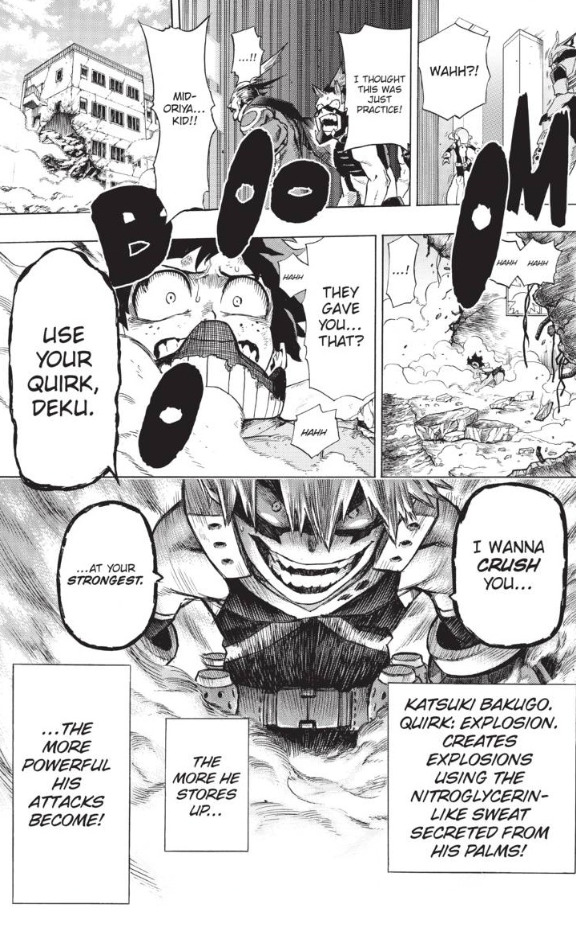
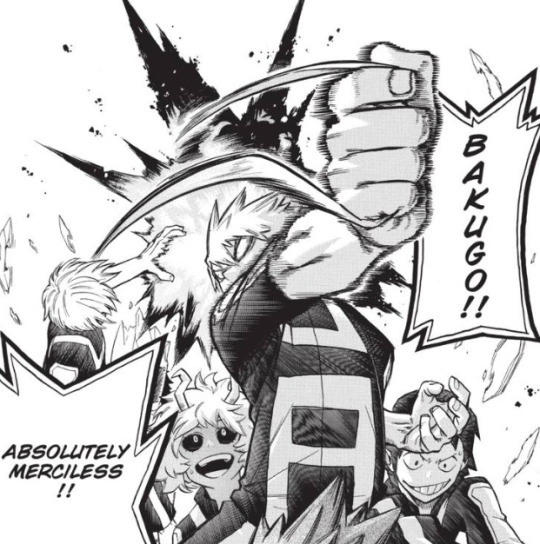
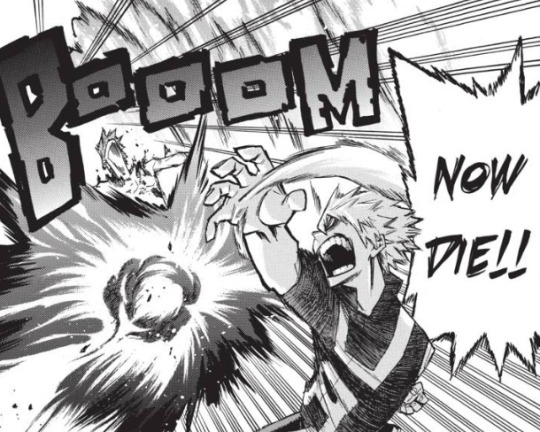

sorry for the image spam btw, I just think they’re funny. he’s so demented lmao. KILL DIE CRUSH.
anyway so we’re gonna do the rest of this below a cut before it gets long. but I promise it really is a Deku post lol. don’t let the pre-readmore stuff fool you. I PROMISE THERE IS A POINT, AND WE WILL GET TO IT.
anyway! so yeah, we really didn’t have the best impression of Bakugou’s whole winning fixation at the beginning there. and I mean, it’s not like we had the best impression of Bakugou himself at the start of things either. we were already primed from the very first chapter to see this kid as an adversary to Izuku. the story goes out of its way to paint him in pretty much the worst light possible. which is why what happens next is so interesting.
because one might see all this and think, “holy heck, this kid is off the shits, somebody needs to set him straight pronto and get it into his head that winning isn’t everything.” because that’s almost the natural conclusion to draw. “look at this kid, he doesn’t care about helping other people at all, all he cares about is winning, someone needs to come along and show him that he’s got it backwards.”
except that’s not what happens, is it? because this is where, much to my delight, Horikoshi came along and started subverting expectations. because not only is Katsuki not rebuked for being so obsessed with winning -- it’s pretty much the exact opposite.
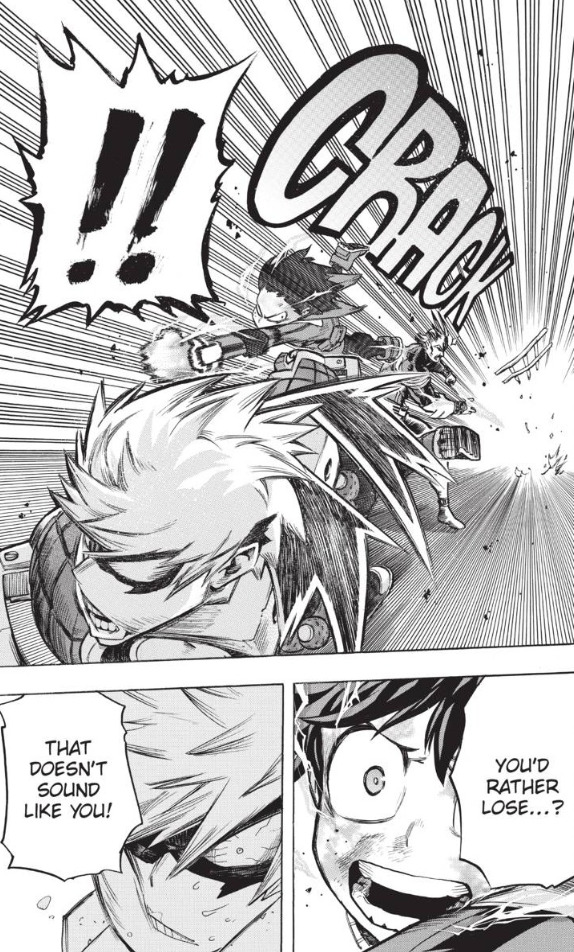
the one and only time Deku ever straight up hands Katsuki’s ass to him is when he says he doesn’t want to win. Deku is IMMEDIATELY all, “THE FUCK KIND OF BULLSHIT DID I JUST HEAR OUT OF YOUR TRASH MOUTH,” and that’s when he sets him straight.
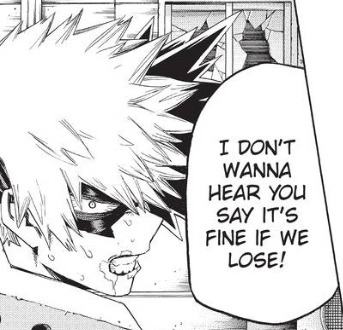

the important people in Katsuki’s life never tell him, “hey you need to cool it with the whole winning thing.” All Might and Aizawa never scold him for it, or tell him that he shouldn’t try with everything he has to win, or that wanting to win is a bad thing. on the contrary, they both commend him for it. and ultimately, he’s told by All Might that this desire is actually one of the two fundamental qualities that every great hero needs.

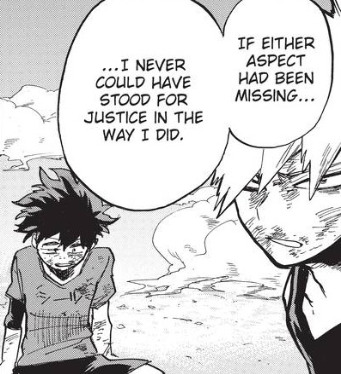
he completely turns the whole thing on its head. not only is it not a bad thing, it’s actually crucial. essential. because what the desire to win really is, at its core, is tenacity. it’s the fiercest kind of determination. it’s not something he should be ashamed of; it’s something that sets him apart, something that makes him worthy. he is someone who refuses to back down no matter what. refuses to give up, no matter what. and this quality, which is initially misunderstood by some to the point where even the villains mistakenly take him for one of their own in the making, is eventually validated to the fullest degree by the person that Katsuki looks up to the most. his desire to win goes from being this awkward “son wtf are you doing” thing to being one of the core philosophies of the series. and ever since then, we pretty much don’t question it.
so why do I bring this up now? well, the answer to that can basically be summed up in one word.
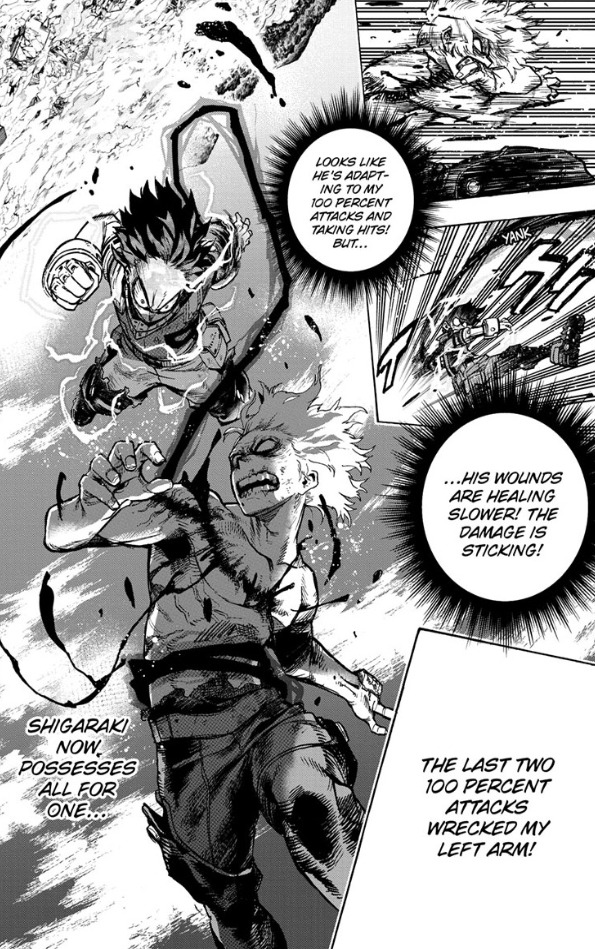
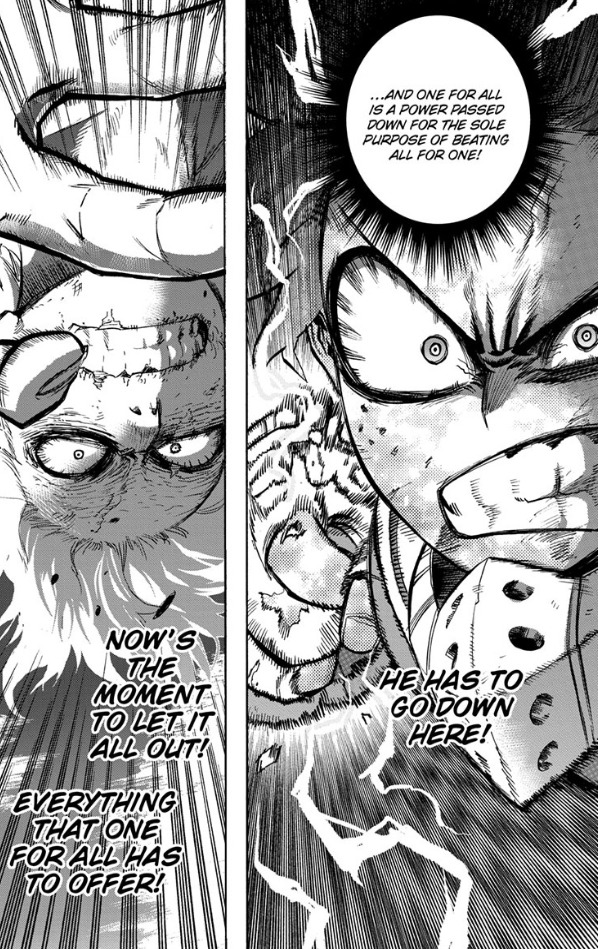
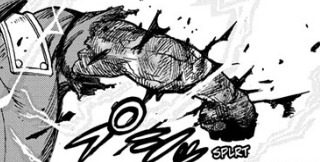
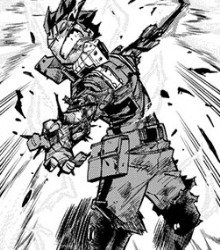
“parallels.”
so here’s the thing. there’s been a lot of talk lately about Deku’s ridiculous, reckless, and absurdly self-destructive desire to save others while having little to no regard for himself. currently he’s lying in a hospital bed, having broken approximately 218 out of the 206 bones in his little hero body (yes, somewhere along the way he found an additional dozen bones to break). it is worrying. it is Concerning. and it’s raised a lot of questions, such as “???” and “wtf is this idiot doing.”
and a lot of people have been pretty critical of him! this is, of course, an ongoing thing with this child, and people have been giving him grief over it going as far back as chapter 6.
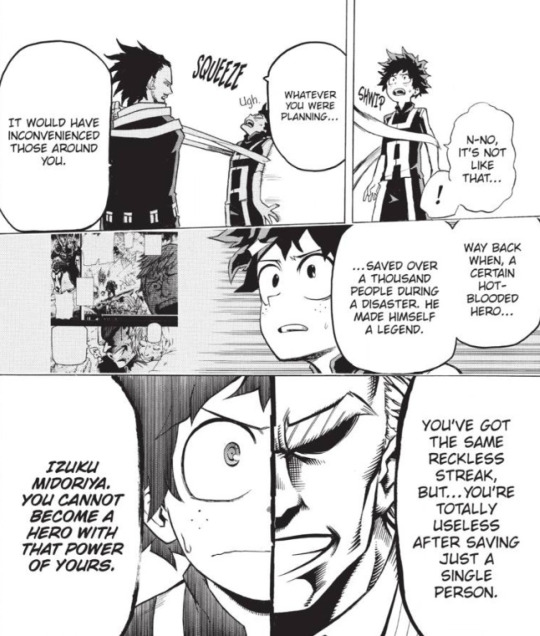
while others have been bothered by it going even further back than that.
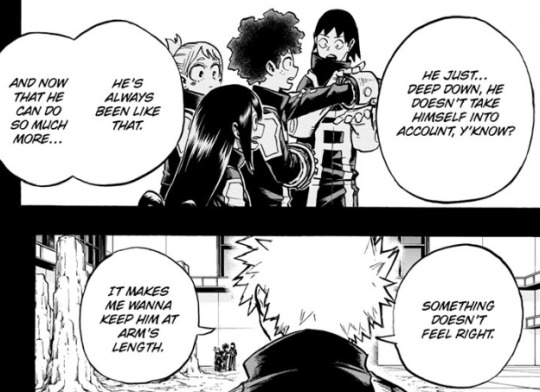
and I’ve seen these sentiments being echoed pretty frequently in the fandom as well. and there are basically two talking points that I want to address here. the first is the idea that Deku’s aggressive brand of selflessness stems from an inherent lack of self-worth. in other words, because he prioritizes other people’s safety and well-being above his own, and is willing to go to such drastic lengths to save them, there’s this feeling that he doesn’t value himself enough, that he must not care about himself.
but I don’t think that’s quite it. let’s go back to those parallels first, though. let’s take another look at Kacchan.
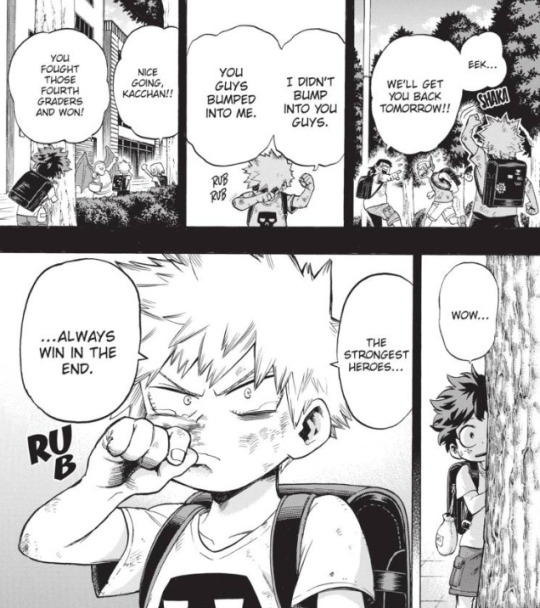
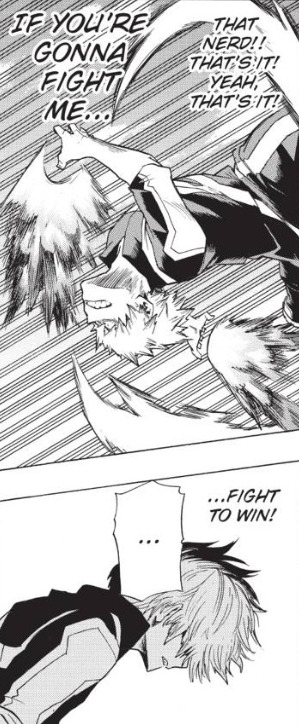


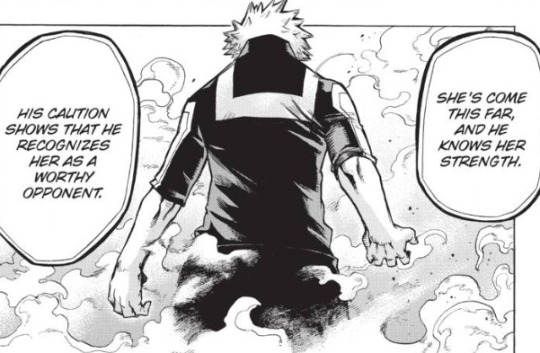

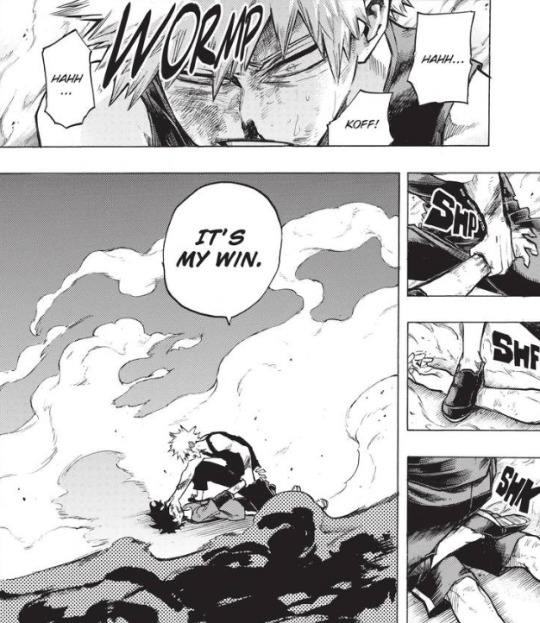
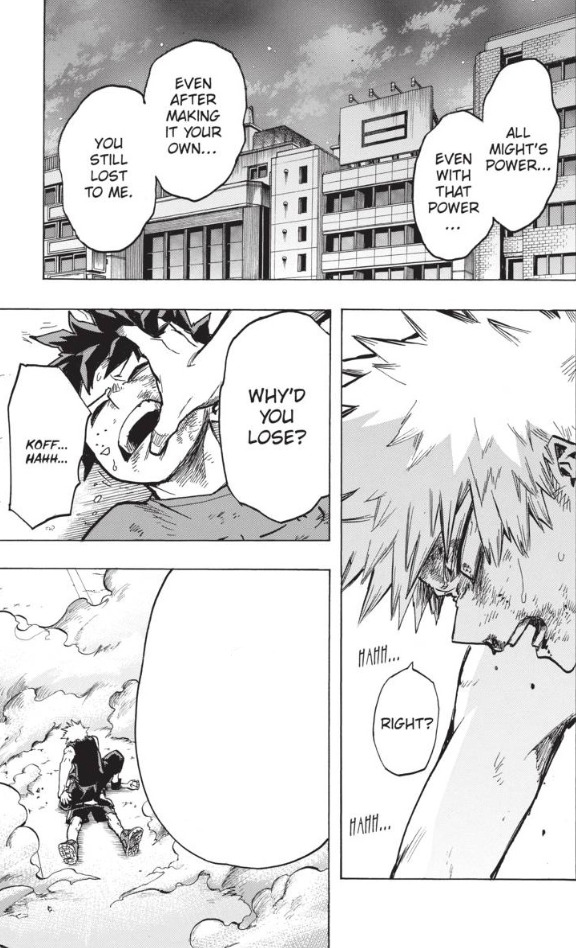
what I mainly want to call attention to is the intensity here. again, it’s something that at first strikes most readers as being absurdly over the top. the truth is, I think a lot of people simply can’t relate to it. Katsuki cares about winning with a ferocity and a fervor that most people, for better or worse, simply don’t have. I certainly don’t, lol.
but he does. to him it’s not a shallow, superficial thing at all. it’s important to him, perhaps the most important thing. I think we often talk about it in terms of it being a desire, but imo a more accurate way to define it is not as a want, but as a need. in other words, it’s the opposite of the question “what is it this character wants” (i.e. “what is it they can’t live without”)? instead, it’s a question of “what is it they don’t want” (i.e. “what is it they can’t live with”)?
and in Katsuki’s case, the thing he can’t live with is feeling like he hasn’t tried his absolute best. he needs to give his all in everything he does. he wants to win, but winning just on its own is not enough.

it has to be earned. he has to prove to himself and to everyone else that he deserves it. anything less than that is unacceptable. anything less than that, and he can’t be at ease. he can’t be settled. he can’t rest. and so he puts everything he has into winning, even if it means going to extremes. because it’s that important to him.


it’s something that’s at times alarming and even disturbing for others to witness. but nonetheless, it’s a part of who he is, and at the end of the day his teachers accept that, and the story acknowledges that it’s his greatest strength.
so now, to finally bring this back around to Deku, this is what I keep seeing in his character as well. only in his case, the thing he can’t live with is knowing that he didn’t do everything he possibly could to save someone. or to put it another way, Deku, at his core, is someone who cannot rest until he knows that everyone is safe. simple as that. it’s not just a desire to protect people; it’s a need. he needs to know that everyone is safe and protected. otherwise he can’t be at ease. it’s no different from how normal, everyday people aren’t able to feel at ease unless they know that they are safe and that their loved ones are safe. it’s just that in Deku’s case, this same fundamental need extends to everyone, not just himself and his friends and family. everyone. he can’t live with himself knowing that someone was in trouble, and he had the ability to do something to help, but didn’t. and so, if you literally can’t live with not doing something, you basically have no choice but to do it.
and this is what in my opinion defines Deku’s character. Kacchan, in trying to understand it, noted that Deku doesn’t seem to take himself into account. but I think OFA Prime summed it up a little more accurately. “he rages for the sake of others. for them, he does his best until he can do no more. this young man is possessed by a drive to save others that eclipses all common understanding.”
so yeah. it’s not that he doesn’t care about himself at all, it’s that he cares about others even more. he has that same intensity and ferocity towards saving people that Katsuki has towards winning. and just as it was difficult at first for fans to understand Katsuki’s feelings, it’s hard to fathom the sheer depth of that “save everyone” feeling that compels Deku to break his own body in that pursuit. it’s scary, not to mention extremely destructive and dangerous. and so really, it was almost inevitable that there would be some backlash.
but just like Katsuki’s desire to win was ultimately validated in the end, I think Deku’s desire to save others will be as well. in fact it already is being validated, for starters by the other denizens of OFA, led by Lil Bro as mentioned above. let’s go back for a moment to that same scene.

here we get a huge hint that “Deku gets taken down a notch and chewed out and scolded for his recklessness” is not, in fact, the direction that the story is going in. because in general, when the main villain starts mocking the hero and saying that they’ve done something wrong, that’s a very good sign that said hero is actually on the exact right track. like, no offense, but as far as character critiques go, AFO is probably the least qualified person in the entire manga to start offering those up lol. so yeah. if AFO is denouncing Deku for something, and OFA Prime is praising him for that exact same thing, I think it’s safe to say that means he is in fact doing something very, very right.
“okay but makeste, he nearly got himself killed and broke all of his arms AND legs and is now lying in a fucking coma,” you say, gesturing emphatically to the last page of chapter 298. “so I mean, that’s all well and good that Wonder Boy has the best of intentions and all that, but at the end of the day he’s only one kid. he literally can’t save everyone, and if he pulls one or two more stunts like this, he’s going to get himself killed.”
and okay, but this here is the other talking point that I wanted to address. because it’s true, Deku does need to learn a specific lesson here. but that lesson is NOT that he can’t save everyone. this is a superhero story, guys -- “you can’t save everyone” is never going to be the underlying message, ever. it’s the OPPOSITE of the message. Deku is the hero because he tries to save everyone. because he doesn’t give up on saving people no matter what. that is literally the core of the story. it has been since the very first chapter.
so then what is it that Deku actually needs to learn here? well, once again, it all comes back to those parallels.
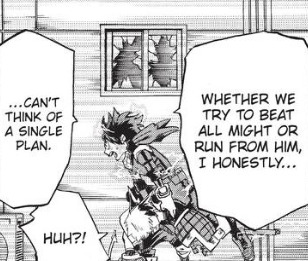
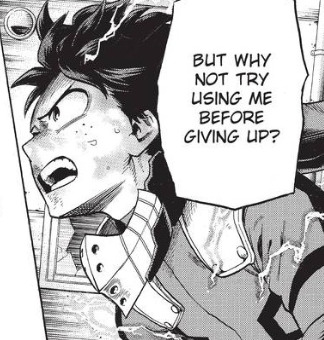
btw, I really just love how he’s carrying Katsuki there lol. he’s just so done with him.
but anyway. so, the final exam arc. Katsuki initially wants to win at all costs -- but there’s a hitch. because even though he wants to win, he refuses to do so while working with Deku. enter Deku’s left hook, and one impromptu Rival Encouragement Speech later, our boy has thankfully come to his senses.
but here’s the point -- the lesson here wasn’t “you can’t always win.” rather, the lesson that Katsuki needed to learn was that you can’t always win alone.
yeah. so now you can see what I’m getting at here.
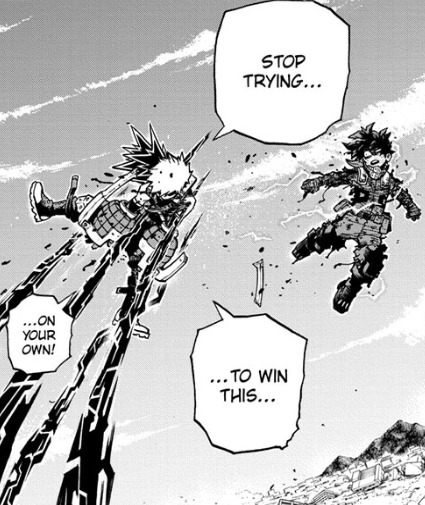
“...on your own.”
that’s the key. this is the one and only thing that Deku actually needs to get into his head. wanting to save everyone is fine! his will to save others has never been a weakness -- it’s been the most admirable thing about him from day one. it’s what makes him strong. it’s why All Might chose him. it’s why OFA has chosen him. it’s what sets him apart, and I firmly believe it’s what will ultimately help him save the day and defeat AFO as well. because what other character would look at Shigaraki Tomura, the person who just impaled his friend and destroyed an entire city, and instinctively reach out a hand to try and save him? and if you don’t think that’s going to wind up being key to the final battle, you and I have very different ideas about this series’ endgame.
Deku’s determination to save everyone isn’t arrogance or futility. it is and always has been his greatest strength. but what he’s missing now, what he needs to learn, is simply to trust. y’all might have seen that theory about the Fourth’s quirk, and why All Might was so hesitant to tell Deku about it. basically, the theory (which is based on an attempted translation of the crossed-out parts of All Might’s OFA notebook) goes that the Spidey Sense was so overwhelming that the Fourth -- whose cause of death was one of the things crossed out -- eventually couldn’t bear it, and went to live alone in the middle of the woods somewhere. and possibly wound up killing himself?? all of which is just speculation right now of course. but it makes sense. and it would certainly explain why All Might, being all too aware of Deku’s self-destructive tendencies, would keep that from him.
but if this is the case, that means it’s clear that the Fourth’s solution didn’t work. “give up and accept that you can’t save everyone” clearly is NOT the answer to be had here.
the answer is trust. trust that his fellow heroes have his back. trust that they’ll be able to help him reach the people he’s not able to reach on his own. trust that they can work together to save everyone. that he doesn’t have to rest the entire world on his shoulders alone.
it’s the one lesson that All Might, his predecessor and his teacher, never learned himself until it was too late. but of course, All Might never had a prickly and determined rival who was ready to step in and deal out some tough love if need be. a rival who, perhaps, just might soon get a chance to repay an old favor.

“I don’t wanna hear you say you can’t save someone.”
I’m just saying. just as Deku has been watching Katsuki all this time, and admiring his determination to win, and emulating it himself, so has Katsuki recently begun to emulate Deku’s determination to save others. we’ve seen it not just in his recent act of self-sacrifice, but even in little things like his habits and tricks of speech. just like Katsuki is Deku’s image of victory, Deku is becoming Katsuki’s image of saving others.
and so I’ll bet you anything that if Deku ever starts to doubt himself, or starts feeling like his dream and desires are futile, Kacchan will be there to set him straight with a good old fashioned Rival Encouragement Speech of his own. possibly with his own left hook to match, though his left shoulder is currently out of sorts atm so he might need to modify that approach a little bit. but the point is, he’ll be there. and he will not allow Deku to give up on himself. he will be there to remind him that he doesn’t have to face this alone.
so yeah! finally managed to wrap up my giant Deku meta which I’ve been working on for ages and rewritten like fifteen times lmao. just in time for this to be relevant for all of a day, probably, depending on what happens once chapter 279 drops lol. but yeah. tl;dr, local boy tries to do too much, but his heart is in the right place, and hopefully all he really needs is a good pep talk from his tsundere bff to set him to rights again. r.i.p. to the Fourth, but he’s different.
#bnha 298#midoriya izuku#bakugou katsuki#bakudeku#bnha meta#deku meta#bakugou meta#bnha#boku no hero academia#bnha spoilers#mha spoilers#makeste reads bnha
483 notes
·
View notes
Note
Bruh, we don't want to hear about your negative views about cleriths. Cloud loves Aerith and he always has. He lives in her church because he loves her. He thought of Aerith a lot in OG , On the Way to A Smile, and AC. He went to live in her church. Why tf would he go live in her church if it wasn't for Aerith? There are millions of places he could've gone but he chose the church. You don't have to believe our way of thinking if you don't want to, but don't tag clerith in your posts.
Thanks for your question.
I think it's important to have these conversations so we can clear up these misunderstandings. Clouds motivations have been well documented so it's unfortunate that large swaths of the fandom seemingly are still in the dark about something that has been known for quite a long time, and I blame lack of communication.
Before I answer your question though I'd like to address the style of it, since I find it amusing that in response to my article concerning productive conversation styles you not only used one of the styles I described, but even the same exact argument. This is a nice confirmation for me that I am right on the money.
In my article, I said that the "dishonest inquiry" is the Clerith conversation style of choice. The example I gave was as follows:
The dishonest inquiry:
“Why don’t you admit that Clouds actions in AC show that he doesn’t love Tifa?”
You mirrored this approach by saying "Why tf would he go live in her church if it wasn't for Aerith?". The defining characteristic of the dishonest inquiry is that the question isn't asked with the goal of seeking clarification, but as an offensive tactic meant to attack the others position, you're not trying to evaluate your position, you're trying to get others to re-evaluate their position under the guise of a question.
If we look at the rest of your post we can see the indicators I described for someone who has reached the last stage of the debate style.
"Cloud loves Aerith and he always has. He lives in her church because he loves her". As I noted in my article:
If assertions are backed up, they are backed up with other assertions designed to dissuade rebuttals, rather than investigating veracity.
This "argument" had no actual arguments, it was a meaningless assertion. Stating that you are correct in an attempt to avoid having to actual show that you're correct. "Cloud loves Aerith and he always has. He lives in her church because he loves her": This is what you're trying to prove, you can't state what you're trying to prove as your starting premise.
If you're honestly interested in learning more about FFVII then leave out the baseless assertions, they literally just waste peoples time and makes them less willing to engage with you.
If I had to rephrase your question in a way that's more inviting for a productive discussion it would be something like this:
"Why do you believe Cloud chose Aeriths Church as his hiding place in AC? He thinks about Aerith a lot, what do you think the reason is for that if it's not love?".
The answer to this is pretty simple of course, it's been restated several times, this is not something that is some grand mystery, it's not even an aspect of FFVII that's particularly ambiguous. The reason he stays in Aeriths church is the same reason he's seen lingering at Zacks "grave", it's guilt.
As stated in the 10th anniversary ultimania, and several other times:
when Cloud contracts Geostigma he disappears. Behind these actions lies feelings of guilt towards his past failure to protect people who were important to him
While this is an element of the story that has been explicitly confirmed through ultimanias and quotes, this is not an element of the story that was ever in any way unclear, its a direct continuation of Clouds character arc in FFVII. Infact, Clouds mental health issues are the central part of the fake persona storyarc, and is arguably the core of the story.
The rough order of events shown in FFVII, on the way to a smile, and Advent children (and also CC) concerning Clouds mental health is as follows.
1: Cloud as a boy want to protect Tifa.
2: Cloud fails to protect Tifa.
3: Cloud and townspeople blame Cloud for Tifas injuries.
4: Cloud internalizes this and beats himself up over his failure to protect Tifa. He develops a fear of failure.
5: Cloud starts acting up, starts wanting to prove himself, and decides to join Soldier to impress Tifa.
6: Cloud fails to get into Soldier, develops an inferiority complex.
7: Cloud is too ashamed of his failure to face Tifa.
8: Cloud fails to save his mother.
9: Cloud fails to save Nibleheim.
10: Cloud fails to save Tifa, again.
11: Cloud fails to save Zack.
12: Cloud develops a soldier alter ego that is everything that he isn't, as a defense mechanism. He hides from his own weakness.
13: Even as a soldier, Cloud fails to save Aerith.
14: Cloud regains his memories in the lifestream, and discovers he did fulfill his promise to come save Tifa.
Here we basically end FFVII, and go into on the way to a smile. At this point Cloud has overcome the alien parasite messing with his mind by establishing a stronger sense of who he is. However, now that he's lost his fake soldier defense mechanism he's forced to deal with the past. His past failures haven't been fixed, he doesn't suddenly think he's a great person now, he simply can no longer use his fake persona to hide from his own weakness, and is forced to confront it.
15: Cloud still blames his own weakness for the deaths of Aerith and Zack, he thinks that he needs to atone for his sins, and thinks that the only way to do this is through living*
16: Cloud starts living with Tifa and experiences happiness and peace for the first time in his adult life.**
17: Cloud develops cherophobia and survivors guilt. He feels ashamed for being alive and happy while Aerith and Zack are dead because of him.***
18: Clouds mental health deteriorates because of these feelings.****
19: Cloud finds Denzel and sees him as a way to atone, having found a pathway to redemption, Clouds situation improves.*****
20: Cloud is unable to save Denzel from geostigma, and contracts it himself.
21: Clouds mental health worsens again, he failed again, he is unable to save Denzel, he is even unable to save himself, he won't be able to atone for his sins through living. He potentially brought an infectious disease into the house and as a result of his actions Tifa and Marlene will now lose him.
22: Depressed and ashamed, Cloud runs away. He thinks Tifa and Marlene are better off without him, he doesn't want them to see him waste away and die, he feels like he doesn't deserve to be happy and should instead die alone, Etc. Classic depression.
(Some quotes concerning the *** are at the bottom of the article)
As for why he thinks about Aerith and Zack a lot, and hangs around the places that are connected with them, what else do you expect? Of course he's thinking about them, they're the people he failed, they're DEAD because of him. Cloud is a caring man, he beats himself up over it, of course he'd be thinking about them. And where else would a man wallowing in guilt and self-pity go than to those places?
But the important thing to remember is that none of this is supposed to be seen as romantic. It's supposed to be viewed as sad and negative. Every internal character arc has something to overcome and this is what Cloud has to overcome in Advent children.******
Tifa to Cloud: "have we lost to our memories?"
Cloud to Sephiroth: "Stay where you belong, in my memories"
A well written story has internal and external obstacles to overcome, and ties the two together. In the case of advent children, the return of Sephiroth is the physical representation of Clouds internal character arc, which is that he should stop living in the past, and should move on. The past here isn't a positive thing he wants to get back to, Clouds past has always been a thing he's ran away from, but then is forced to accept. The past in Clouds case is a bad thing, his failures, and is something he should stop dwelling on.
If you've ever seen the lion king, this resembles the scene where Rafiki hits Simba with a stick. "What does it matter, it's in the past", "yeah but it still hurts", "Oh Yes, the past can hurt, but the way I see it you can either run from it, or learn from it".
When Cloud returned to his normal self, he stopped running from the past, but as a result, he started dwelling in it. That's what he's doing in Aeriths church; dwelling in misery.
If we juxtapose Aeriths church with the 7th heaven, we can start to see where peoples misunderstandings are taking place.
When some people look at the events of ACC they think that 7th heaven is a place of sadness, which Cloud leaves to be happy at Aeriths church, the place of happiness. The "have we lost to our memories" is then seen as a confirmation of this and that the memory, which they think corresponds to Aerith, is better than life with Tifa. This character arc then concludes with Cloud being happy by finally leaving Tifa behind, and riding off in the sun-set in search of Aerith at the end of the movie.
But this interpretation falls apart as soon as you apply context to it, both narratively, and factually, it doesn't fit with with developer quotes, as well as the fundamental story themes of FFVII.
1: If 7th Heaven/Tifa is a place of sadness, then why has Cloud been consistently quoted to experience happiness there?
2: If 7th Heaven/Tifa is a place of sadness, and Cloud leaves at the end of the movie, then why has it been stated to be his promised land, aka, his land of supreme happiness (the reason it's literally called 7th heaven), and why is he stated to return there? *******
3: If Clouds "memories" are positive, why is the plotarc resolved by Cloud telling the villain to "stay there"?
4: If Cloud is happy at the church, why is he living in self-deprecating squalor?
5: If Cloud loved Aerith and thought Denzel was sent to him by her, why did he abandon him?
6: Do you really think SE would write a story about a "hero" whose main emotional hurdle concerning the past comes down to. "I am sick of the girl I am with, I prefer the one that is dead, so I will get over the past by letting go of the girl I am with, as well as my adoptive children, to go chase the dead girl"?
7: Don't you think this would do Tifas character a tremendous disservice and do you think SE would be that preferential in their treatment?
I could go on, but I think the point is clear. While the "Aeriths church is a happy place" interpretation is semi-coherent when looked at in isolation, it becomes exceedingly bizarre as soon as you place it in context. As I am fond of saying, this is not a matter of personal interpretation, it's a matter of lying to yourself vs not lying to yourself.
I also suspect that this is the reason why SE changed the ending to advent Children, because people were misinterpreting it in this bizarre way, so they made it more in your face.
In context, the following interpretation is much more fitting.
Aeriths church is a place of sadness that Cloud runs to because of his guilt and depression. The "memories" line refers to Cloud dwelling on his past mistakes, as evidenced by his constant quotes about needing forgiveness. The character arc of moving on from the past is then resolved when he forgives himself, and as a result, defeats sephiroth, the metaphorical demon of his past. This allows him to return to his place of joy, his promised land, the 7th heaven, with a more positive outlook on the past. Instead of tarnishing Aerith and Zacks memories by wallowing in the past he instead moves on from it, thereby allowing it to become beautiful, which is represented by him planting Aeriths flowers on Zacks grave, and placing Zacks sword in the church. Instead of Zacks grave being the place where Zack died, it is now the place where a hero was born. Cloud has moved on, he has let his mistakes go, and has learned to come to terms with himself.
I think it's hard to argue that this version of events is much less shallow, and much more meaningful than the story of a lovesick guy who abandons his partner and adoptive kids to go chase after a dead girl, but that's just me, what's more important is that it's the only version of events that's corroborated by the evidence.
Thanks for the question.
__________________________________________________
Corroborating quotes (not comprehensive)
* from case of Tifa: "“I’m going to live. I think that’s the only way I can be forgiven. All sorts of things…"
** Nojima in AC prologue: "“Cloud never had a candid personality to begin with, and although he started living with Tifa and even started working, he obtained a peaceful livinghe’s never experienced before, and this conversely made him anxious. And in the midst of this he contracts Geostigma himself, and rather than being able to protect the people dear to him, he instead was forced to face his own death, and so ran away.” (among other quotes)
*** 10th anniversary ultimania: "when Cloud contracts Geostigma he disappears. Behind these actions lies feelings of guilt towards his past failure to protect people who were important to him"
Aeriths 10th anniversary profile : Aerith still lives on in the hearts of her friends who saved the planet. And in particular to Cloud, as a symbol of his failure to having being unable protect those dear to him, she was a major factor in causing him to close himself off. -Aerith’s 10th anniversay profile.
And more, really this is reiterated constantly.
**** From case of Tifa: "During that time, it was Marlene who noticed a change in Cloud. She told Tifa how Cloud would sometimes space out and not listen to her.
Transporting mail around the world meant he was traveling around his past too. She knew that Cloud was in great pain because he couldn’t protect Aerith. Cloud was trying to overcome that and live on. But, going back to the place where he parted from Aerith might mean that his sorrow and regret was going to tear his heart again.
It was night, and they had closed the bar. Cloud was drinking alcohol even though he rarely did. He drained his glass. Tifa thought about it before going over and filling his glass.
***** From case of Tifa: "Tifa wondered if they became a real family after Denzel appeared. Cloud was clearly taking less jobs. At night, he would always make sure he had time to spend with the children. The silly little conversations he had with Tifa were also back."
****** Reunion files, page 58: "As long as Cloud blames himself for Aerith’s death, he won’t be able to move on with his life. One of the first ideas we had for Advent Children was to have Cloud overcome and resolve that immense feeling of guilt. For Cloud, no one other than Aerith can solve that problem for him."
- Takahiro Sakurai pg. 15 reunion files: After Cloud was told, “Which is it? A memory or us?: by Tifa, he tells Sephiroth, “Stay where you belong. In my memories,” just before he defeats him. I think Cloud finally becomes free at this moment. Deep down, Cloud knew that he shouldn’t be so hard on himself, but at the same time he couldn’t let go of those feelings of guilt for what happened to Aerith and Zack, or the thought that he could never forgive himself for it. But then his companions made him feel better by telling him to let go.
******* "The place where he awakens—-
That is Cloud’s Promised Land
As he sleeps, Cloud hears two voices. The voices of two people very dear to him, who are no longer with him. Playfully and kindly, they give him a message: he doesn’t belong here yet.
When he awakes, there was his friends. There were the children, freed from their fatal illness. Tifa and Marlene, and Denzel asking for Cloud to heal his Geostigma— his family were waiting. Engulfed in celebration, he realizes where he is meant to live."
"Aerith lends her power to the people suffering from Geostigma in Edge, and personally provides for Cloud’s recovery. Geostigma is cured. Cloud returns to Tifa and the children."
- FFVII 10th Anniversary Ultimania Complete Timeline
125 notes
·
View notes
Text
Online Trading In The Stock Market Today.
Online Trading In The Stock Market Today. Today, thanks to the internet, online trading in the stock market is open to pretty much anyone with the cash to invest and access to the internet. With this newfound capability for even the typical individual to get involved in the stock market comes both advantages and disadvantages. In this short article, I will review a few of the benefits and drawbacks in addition to some ideas of what you can do to ensure you are protected from making expensive monetary errors when you get involved with online trading in the stock market. PROS: Easy gain access to 24/7. Even though the stock market isn't trading around the clock, you will have access to numerous of the tools and resources of an online trading platform. The ability to make trades for an extremely small commission. This can assist the little financier who is simply getting started. CONS: 1. There are different trading platforms provided by the online brokerage homes, some of them are more complex than others. Although they claim to be easy to use some people might still have problems figuring all of it out. It depends upon the private and how comfortable they are with knowing in basic and innovation in particular. 2. It might sound ridiculous however it can be easy to forget that you are dealing with real cash. In cyber land, it's easy to start considering everything as just "digital". If you forget the reality that you are handling real money you might simply end up taking gambles you wouldn't generally take. While I always advocate finding out all you can about being a partner and investing with your broker, there will be times when you have concerns. If you do not have anybody to turn to for the responses you need you might end up making a bad decision. None of these things are overwhelming obstacles and they can be quickly overcome if you want to invest the time. Here are a few things you can do to turn these cons around: 1. Before you register for any brokerage account, spend some time and discover the fundamentals of investing. If you don't understand any much better, even the worst suggestions in the world may sound excellent to you. 2. If you aren't especially good at all things innovation-related, find an online brokerage that uses a complete strategy. That way you can have someone available to address any concerns you may have associated with investing or simply how to use their software. 3. Carefully compare a few different online sites to determine which one works finest for you. Do not simply go with the most affordable costs for making trades. Think about other elements like the trading platform they utilize and whether it is a complete brokerage or a discount brokerage (which normally suggests a lot less assistance will be available if you have questions). As long as you do your part and do your research, online trading in the stock market can be an excellent way for you to take more control over your finances. Just do not ever enter blind, inform yourself initially and you will increase the odds of making more money. Even though the stock market isn't trading around the clock, you will have access to many of the tools and resources of an online trading platform. There are different trading platforms offered by online brokerage houses, and some of them are more complicated than others. If you aren't especially great at all things innovation-related, discover an online brokerage that provides a complete service plan. Thoroughly compare a couple of different online websites to figure out which one works finest for you. Think about other elements like the trading platform they utilize and whether or not it is a complete service brokerage or a discount rate brokerage (which usually indicates a lot less assistance will be readily available if you have concerns). It's a great time to start! an introducing broker: https://live.4xc.com/signup/FG4aG6qb Ian Jackson.
#Forex Trading#FX trader#how to trade forex#learn to trade#how much money can I make trading forex#options trading#how to trade bitcoin#knowledge to action#how much money do I need to trade forex#is trading a scam#financial freedom#earn money online#Money#Trading for beginners#how to trade basics#free trading course
1 note
·
View note
Text
What Does It Mean to Save?
I keep seeing it said that Deku, Ochaco, and Shouto will “save” Shigaraki, Himiko, and Dabi, but that there will be no redemption and/or no survival for them. I’m truly not trying to vague these posts and everyone is entitled to their opinion, but literary criticism is fundamentally responsive so I’m writing this anyways.
I personally think that’s not BNHA’s definition of saving nor of redemption. So here, have a deep dive into literary tropes related to redemption, genre, and character arcs as they pertain to BNHA and the question of: what does it mean to save Shigaraki, Touya, and Himiko?
Before we begin, let me say that while we might be personally uncomfortable with redemption (there’s a redemption arc in BNHA I am personally quite uncomfortable with), that doesn’t inherently mean the narrative won’t go there. The key principle I’m operating on here is BNHA’s message that heroes save people. It’s held up as the highest ideal.

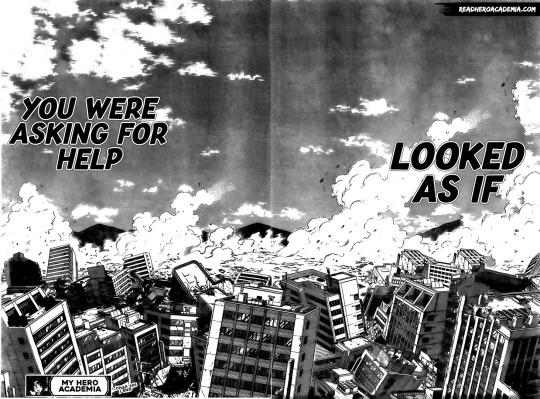
So let’s talk redemption in BNHA-verse. With this guy, whose redemption arc I dislike in principle but accept as part of the story so don’t come for me stans and/or antis. I’m analyzing because it shows us what redemption means in BNHA-verse, whether or not that is satisfying to you personally as it fits/does not fit with your own morality/philosophy.
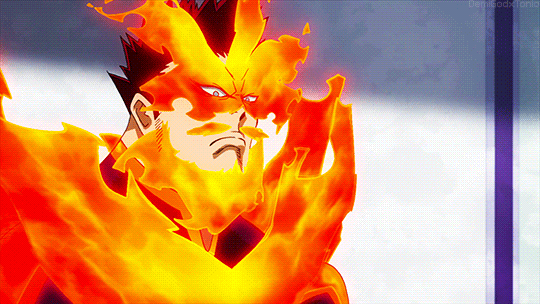
If Endeavor can be redeemed and live, and he’s Bakugou’s negative foil, I highly doubt Shigaraki and Deku as well as Touya and Shouto and Ochaco and Himiko will be any different. Why? Because Enji is an adult character. The others--well, Himiko’s age we don’t know, but we do know that Shigaraki and Dabi are technically adults. But does the story consider them adults?
(It doesn’t.)
Child-coded characters are generally more likely to survive a redemption, which I’ll explain more later. First I have to define what I mean by child-coding, because I DO NOT mean this in the way it’s often (mis)used in fandom wank. Child-coding is a real thing, but it is not done to infantilize and it has nothing to do with shipping.
Child coding frames the character as a child for a few narrative purposes to convey a story’s theme or purpose. For example, if it’s a coming of age story coding a character as a child even if they legally are not emphasizes their journey to an understanding of self-actualization, or a true understanding of self with self-awareness and an understanding of self-value. An example of an adult coded as a child is The Kite Runner, wherein Amir is a legal adult for half the story, even married for fifteen years so we’re talking 30s-40s, but he does not truly become an adult until he returns to his homeland and takes responsibility for a childhood sin. In Attack on Titan, the main characters are now nineteen, but are still struggling to take responsibility as adults and have only started doing so now that their mentors/parental figures have started dying.
Along those lines, in any kind of story, you can code a character as a child of someone, regardless of biological relationship, to convey the type of relationship they have (usually a mentor one). For an example of this, see Bungo Stray Dogs’ Dazai and Akutagawa. Despite their two year age difference, Dazai recruited him to the mafia, abandoned him, and Akutagawa desperately seeks his approval. Usually in these stories a character will “overcome” their parental figure. This can be done through overcoming their need for the parental figure’s approval in stories where the parental figure is kindly (such as in Harry Potter, when in the final book Harry, Ron, and Hermione leave the Weasleys to find the Horcruxes despite Mrs. Weasley’s please) or through like, killing/stopping/leaving the parental figure when they are abusive (see fairy tales like Rapunzel and Cinderella). The parental link to self-actualization is because it is childlike (and a part of actual psychology that is reflected in literature) to see yourself as a part of your parent; self-actualized person would see yourself as a distinct person from your parent, but also acknowledge the ways in which they’ve shaped you.
So, how do you code a character as a child? BNHA isn’t subtle about it, because Horikoshi seldom is subtle about anything. The villain trio are all coded as children.
Shigaraki Tomura:


Who cannot achieve self-actualization so long as AFO has access to his body, as he’s literally trying to possess him. He’s trying, but it’s not gonna work because Shigaraki can’t keep AFO and become an adult at the same time. It’s a choice the narrative is setting up: your dream of destroying, or your freedom? (To get the latter, he’ll probably have to destroy AFO).
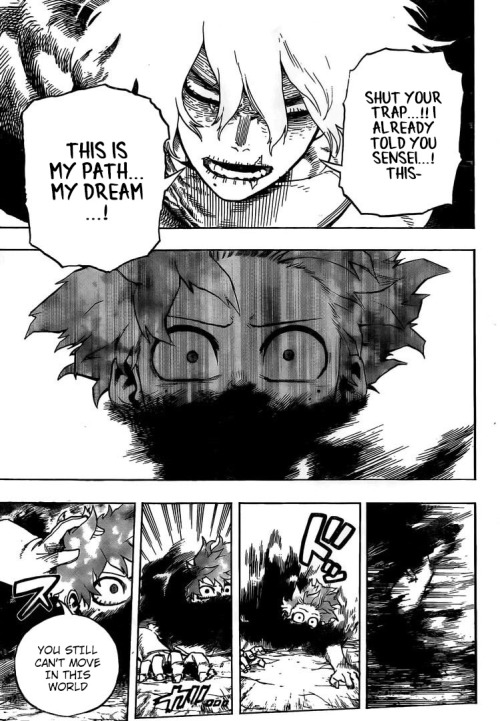
Todoroki Touya, who is repeatedly emphasized as a small child when compared to his siblings, and yes, I know he’s now tall. Specifically he’s spotlighted as the child of Endeavor:
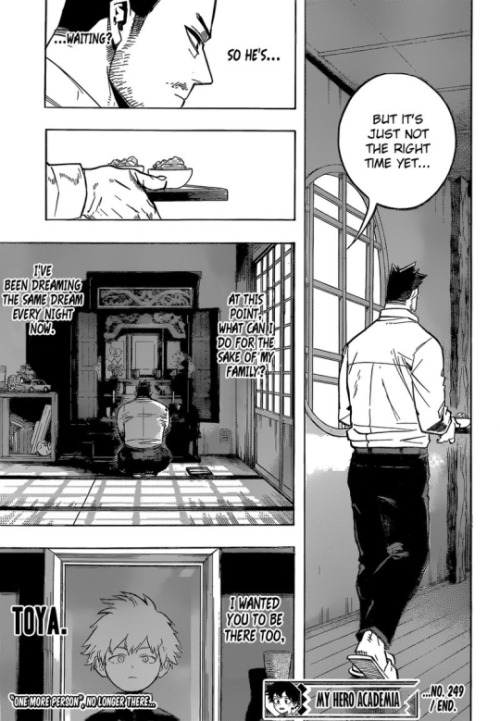

And he’s the least self-actualized one in a lot of ways, contradicting himself constantly. I’m not Endeavor, DUH! But these are Endeavor’s flames! He’s gonna have to choose one or the other, because the tragic irony is that the more he takes out his rage on those around him, the more like Endeavor he becomes.
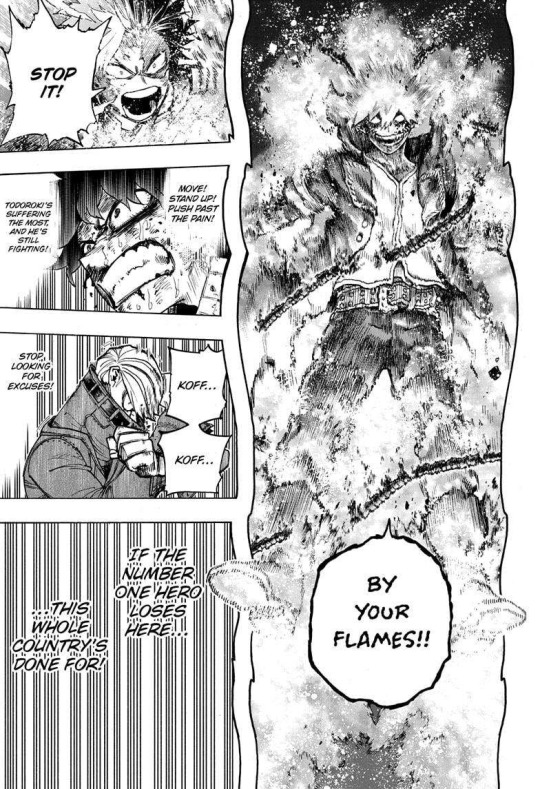

And Toga Himiko (who might well literally be a legal child), who is actually the most self-actualized one thus far, because she rejects Curious’s child insistence (Curious holds her in a Pieta pose, based on Michelangelo’s statue wherein Mary holds a deceased Christ):

She’s still got, like, a way to go though:

Because Himiko also wants to be like the people she loves to the point where she loses her own identity in them, which is er, not self-actualization. So she’ll have to choose whether or not she really wants to be like the people she loves or whether she wants to live her own way, which she herself tells us how that would end (death):

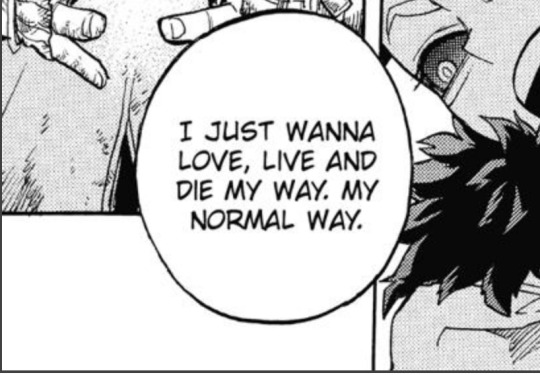
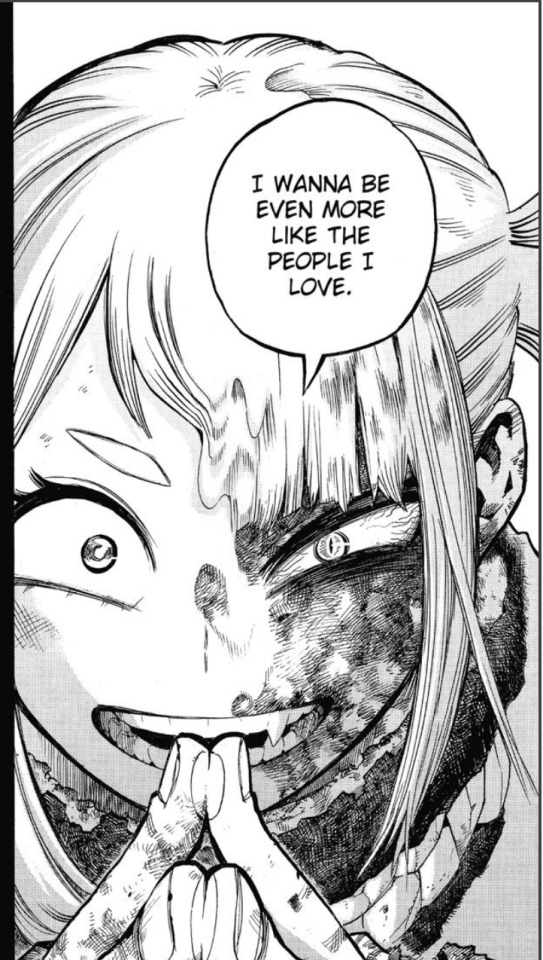
Deku said it himself: it’s good to focus on what someone is doing now. And look, I have issues with this statement and how it’s framed. I’ve talked about it at length and it was doomed to fail because Shouto himself told us long ago that it was annoying to hear a righteous speech by a stranger when you hadn’t gone through the same, plus Endeavor kinda failed by choosing being a hero over a dad here. But, the principle is that if the past doesn’t preclude Endeavor from seeking a better self, why would it preclude three characters coded as children, one of whom is literally somewhat the product of Endeavor’s sins? BNHA doesn’t think the past keeps someone from a better future.
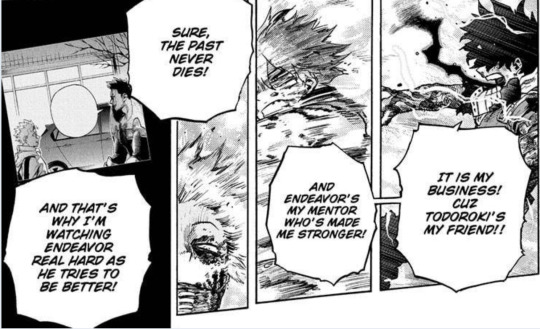
So what about Dabi’s counterpoint, which is indeed valid? Well, redemption doesn’t mean the past forgets, either. It’s complicated and nuanced, and we can debate how well Horikoshi strikes this nuance (it’s got its flaws), and admittedly I don’t know how this will go down in the future. But it is asking Endeavor: how do you redeem yourself to the people you’ve hurt? And we have Endeavor asking this question to Touya’s shrine. I mean, the foreshadowing is obvious. Endeavor has to redeem himself by trying to save Touya. However, it will still probably come down to Shouto to save Touya.

For our three villains, it’s a little harder to predict... well, sort of. For Shigaraki it’s extremely obvious: he has to help take down AFO. Dabi probably has to do something to help his family (siblings probably), but it’s vague. Toga needs help and not condemnation, but presumably she’ll help Ochaco with something.
So, is this redemption? I’d define it as redemption in the eyes of the narrative. To address what makes a redemption is another essay unto itself, but if we bring in the oft-compared Star Wars example: did Darth Vader get a redemption? Did Ben Solo? Everyone says yes to both. However, only Luke witnesses Vader’s redemption, and only Rey Ben Solo’s. So the rest of the galaxy? Doesn’t think so. When I say they’ll be redeemed, I’m defining it as their role in the eyes of the narrative, not whether or not society will accept them or even whether their victims will forgive them (of note, in canonical novels, Leia never forgave Darth Vader despite learning he was her father and obviously knowing Luke’s account of his redemption was true).
So, redemption in a narrative doesn’t mean all of society has to forgive and accept them. Dabi has still like, murdered 30 people--many of whom were thugs, but he himself acknowledges they didn’t deserve to die. Additionally, he himself also acknowledges that the families left behind--their feelings matter:
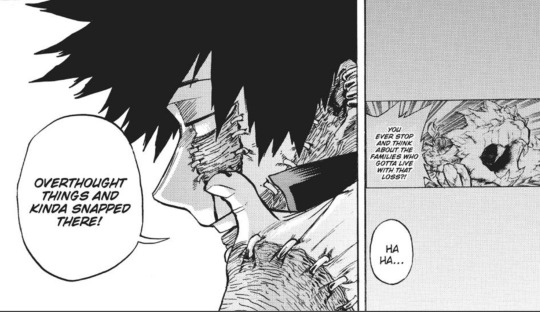
But why does that mean they have to die? Why even does it mean they have to languish in prison forever? (If there’s even a safe prison at the end of BNHA which I kinda have doubts about.) Heroes have also killed: see Hawks as Exhibit A. In fact, some people want revenge on the heroes precisely because they arrested or killed their loved ones (jail isn’t held up as a rehabilitative place in BNHA’s world. In most countries it isn’t in real life, either, but again that’s for another essay). So why don’t the League’s feelings on Twice’s death matter just as much as the feelings of unnamed and unseen (and thereby less important narratively) characters?
Additionally, regarding death... the villains routinely get called on their death wishes. Himiko’s determination to decide how/when she dies is called out because this is right before Twice overcomes his trauma to save her, and the next arc they appear in is when Twice dies trying to save her again. Dabi’s suicide wish keeps him from getting close to others, and it keeps getting thwarted. Shigaraki’s obsession with destruction and death is clearly not a good thing, and his rejection of his family’s desire for them to join him in death this past arc is growth.
In other words: what Dabi said and what Snatch said about families and how they feel matter for the villains too. The villains are their own weird found family (Dabi as the deadbeat prodigal brother of both his families). Their deaths--Magne’s and Twice’s thus far, and I’m not ruling out further deaths in the future--affect the others. People’s feelings on losing loved ones matter. The villains are people, as Himiko said herself this arc:
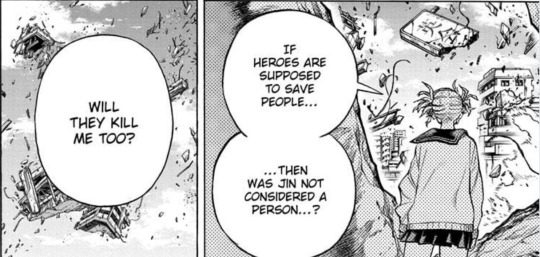
Their feelings about each other matter:
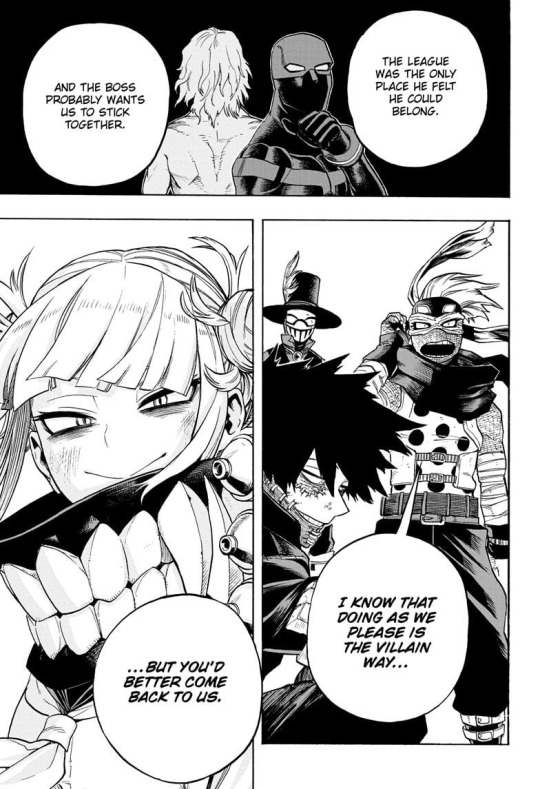
How would Touya dying affect the Todorokis? At least they saved him spiritually, I guess, but that’s absolutely lame narratively, and if you have Enji eventually do a sacrifice to save Dabi (pretty likely, even if I personally think Enji will survive said sacrifice) then what’s the point of Dabi dying? How would Himiko dying affect society? As a martyr like Curious wanted her to be, even a redeemed one? A tragic warning story? What even is the point of Ochaco saving her if that’s the case? If Shigaraki dies, well, who would mourn besides Deku? How would Shigaraki dying affect the surviving members of the league? He just couldn’t be saved physically?
It’s not impossible some of this happens, but it doesn’t seem like great writing, especially with panels like, oh, these that show us BNHA’s perspective on death:
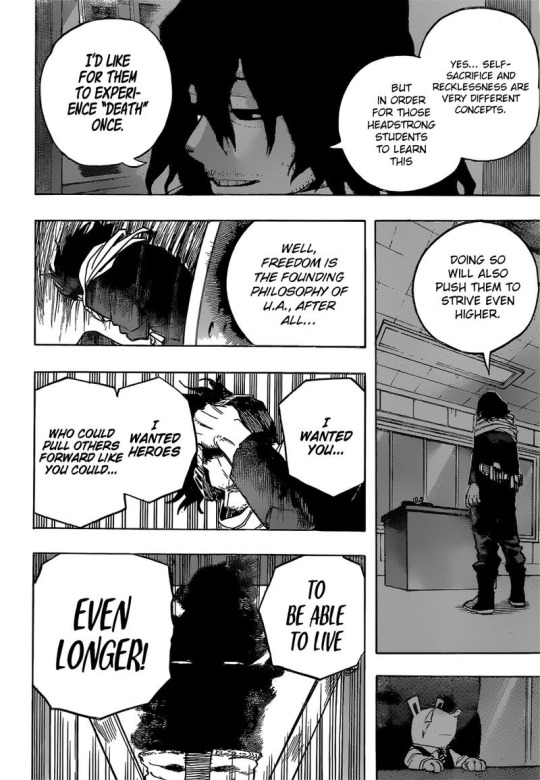
Sacrificing something is a type of death that occurs in stories; this should happen in a redemption arc, which is why I’ve been saying Enji needs to sacrifice his hero reputation to help save Touya and even then it’ll still be Shouto imo who does the saving. But physical death?

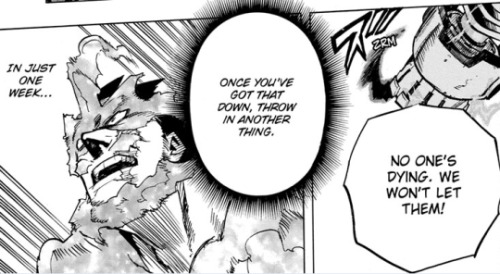
If you want further analysis of the latter two panels and how they relate to the ending, see here.
We already have another villain who will definitely die redemptively (Kurogiri--an adult coded character--because he’s already, like, dead), and Spinner and Mr. Compress aren’t coded as kids so I hold them with anxiety towards the end. But again, this isn’t me being ageist or saying this is the way things ought to be in fiction or real life: it’s me looking at writing tropes and saying that child-coded characters tend to survive their redemptions. See: Zuko. Why? Because the death of children or child-coded characters is a tragedy. When a child-coded character dies redemptively it doesn’t feel like a happy ending and if framed as such, it’s often criticized for bad writing (see: Ben Solo). Curious even called this out in her fight with Himiko. I would hope Horikoshi doesn’t end the story being like yeah Curious was right that’s the best use of Himiko’s/Dabi’s/Shigaraki’s arcs:
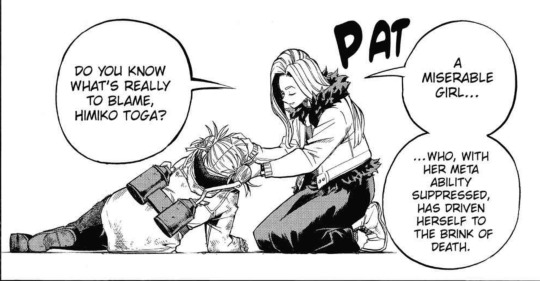

Additionally, as for the believability of a character getting a new chance after so much destruction and murder... well, it’s kinda a thing in shonen and even in seinen? For better or for worse, it’s a thing. We have Vegeta in Dragon Ball Z and Kaneki Ken in Tokyo Ghoul (Kaneki, by the way, is absolutely an inspiration for Shigaraki). We can debate how well-written these redemptions are (I personally have been quite critical of Kaneki’s despite wanting it to happen narratively), but it can be done. BNHA’s Japan especially isn’t as harsh a world as Tokyo Ghoul’s Japan, so it would make even more sense for something like Kaneki’s ending.
The reality is that the cycle of revenge via hurting people and then leaving hurting families and loved ones has to stop somewhere. Someone has to be the bigger person and step up and be like “naw.” That’s heroic. That’s brave. That’s sacrificial itself. Justice itself doesn’t really exist in its purest form without mercy.
There’s another genre-reason I don’t see death or jail as likely (I could see, like, maybe a mental health ward like Rei’s? But it’s too soon to speculate).
If saving is considered a good thing for the story, if it’s truly the highest ideal, then saving someone should be rewarded by the narrative. The characters who save should have a positive result to show us this a good thing.
This is why it doesn’t work for the heroes’ end journey to be accepting that some people cannot be saved. The notion of just accepting that you cannot do something, you cannot save everyone, you cannot, cannot, cannot, is called out as a flaw of society. Determination, on the other hand, is rewarded.
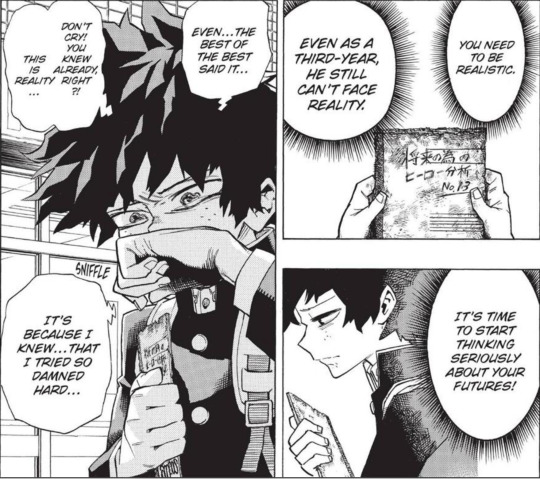
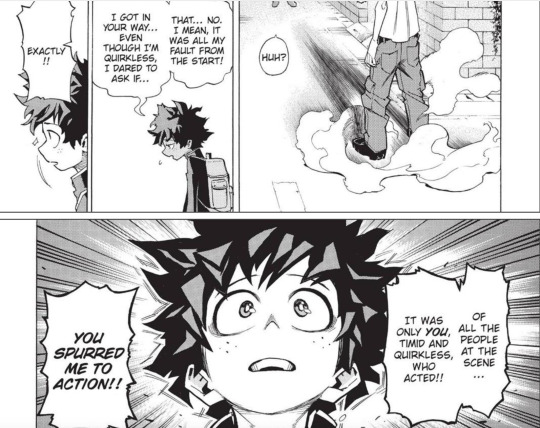
We see it with Deku as well as with Mirio.
So, what if they save them and the redeemed characters then go on to sacrifice themselves in their redemption and die (come to the same end)? If saving changes absolutely nothing for the saved person, if it’s too late for the saved from themselves to change and/or do anything that matters besides die, then the narrative theme of saving as important is left unemphasized at best and undermined at worst. Simple intrinsic knowledge that the kids “did the right thing” doesn’t cut it for a story with so much focus on physical saving when the kids are already doing the right thing; moral struggles about whether to choose to be good aren’t really Deku, Ochaco, or Shouto’s arcs. It works for Aizawa’s arc with Kurogiri, but not for the kiddos. If BNHA was more of a philosophical/spiritual text, that would indeed make sense, but it is not. Genre-wise, BNHA is a fantastical superhero optimistic story, not a gritty real-world set drama.
#bnha meta#mha meta#bnha 295#mha 295#deku#league of villains#shigaraki tomura#shimura tenko#todoroki shouto#todoroki touya#todoroki enji#endeavor#todoroki family#toga himiko#all for one#afo#uraraka ochako#bakugou katsuki#aizawa shouta#bnha theory#mha theory#my hero academia#boku no hero academia#midoriya izuku#kurogiri
635 notes
·
View notes
Note
okay but how do you even get to abolition if you're against all reforms??
lol that’s my bad, i wasn’t being fully serious in that post. abolition isn’t against all reforms; it’s against reformism, or reformist reforms. what that means is that abolitionists are critical of reforms which “subordinate their objectives to the [...] rationality of a given system and policy” or which “reject those objectives and demands which are incompatible with the preservation of the system.” in other words, most reforms which claim they will fix police or prisons are simply validating those systems by pouring more time, effort, money, and resources into them. in the case of the #8cantwait proposal, a lot of the demands call for more training, which costs more money. this type of reformism and the movement for abolition are fundamentally opposed. abolitionist dylan rodriguez explains it this way: “liberal-to-progressive reformism attempts to protect and sustain the institutional and cultural-political coherence of an existing system by adjusting and/or refurbishing it [while] abolitionism addresses the historical roots of that system in relations of oppressive, continuous, and asymmetrical violence and raises the radical question of whether those relations must be uprooted and transformed (rather than reformed or “fixed”) for the sake of particular peoples’ existence and survival.”
so, reformist reforms don’t get us to abolition. how does abolition work? abolitionist campaigns do push for reforms, but a certain type of reform which DOES move us toward abolition: non-reformist reforms. these are measures which reduce the power of oppressive systems while illuminating their fundamental inability to solve the crises they create. these reforms return power and resources to the public while shrinking systems; they move beyond the logic of the prison-industrial complex to prefigure a more just world. they often involve taking money and resources AWAY from the system. in the case of police, this might look like making it easier to fire police, making it so that the settlements for their lawsuits come out of their salaries rather than taxpayer money, reducing police budgets or the size of police forces, etc. these don’t get us to abolition in one fell swoop, but they do get us a little bit closer to a world without police.
it can sometimes be hard to tell whether a given proposed reform is reformist or non-reformist. in the wake of the murder of mike brown and the subsequent protests, many cities adopted body camera legislation. when these measures were passed, many believed they would lead to increased police transparency and make it easier to get rid of cops who used excessive force. however, abolitionists point out now that police departments received new equipment and increased funding, while the public gained little as people continued to die at the hands of police. there are a couple different tools i use in organizing to evaluate whether a given reform is reformist or non-reformist. the first is a set of questions from abolitionist erica r. meiners:
who benefits from this campaign, initiative, reform, form of resistance? who doesn’t, and why?
what are the logics, languages, and “common sense” discourses that initiatives validate and/or reinforce? are these logics liberatory or punitive?
who is working on this initiative? who is not? why them? why now?
is this something that we, or others, will be organizing to undo in five years because it is used to cage or dehumanize people?
looking at these questions and thinking about the #8cantwait campaign, i think it becomes pretty clear that those measures are not worth supporting. police departments and governments benefit if these measures are adopted by the movement because the revolutionary energy which has resulted in calls for police abolition gets co-opted into proposals that will actually give more money to police. the proposal assumes that more police training will fix police brutality, and that a 72% decrease in police brutality is an appropriate goal when the rest of us won’t settle for anything less than a 100% decrease. the organization behind #8cantwait is campaign zero, whose website says it spends donations on "the analysis of policing practices across the country,” “research to identify effective solutions to end police violence,” and “the development of model legislation and advocacy to end police violence nationwide.” analysis, research, modeling; none of those things actually concretely reduce the size or power of the police.
the other resource i want to mention is a graphic from abolitionist org critical resistance that can help evaluate proposed reforms as well. reformist reforms are in red and non-reformist reforms in green. most of the #8cantwait fall under more training, highlighted in red.
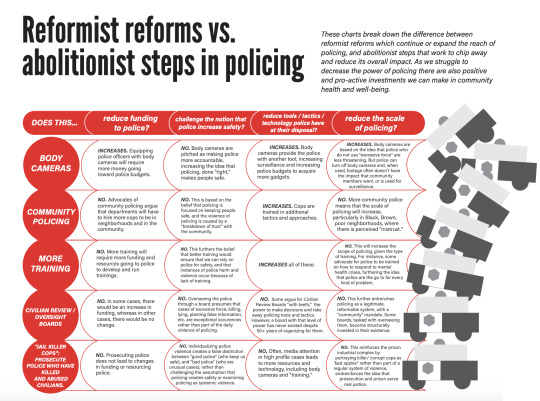
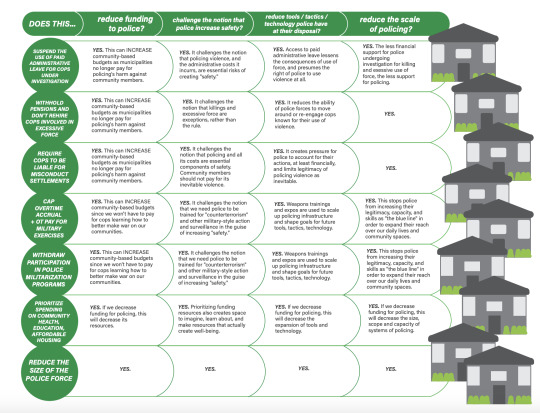
3K notes
·
View notes
Text
yohan + physical tough + trauma response
disclaimer: this is based off of eps 1-7, and preview of ep 8; i wholeheartedly recognize that this post may become the worst meta ever depending on how the rest of the show goes. however, i do think there are still some interesting things to note about yohan. a lot of this is also me just talking shit out as i was sifting through all the eps again. i’m more than willing to change my mind or hear other thoughts.
also i kinda, sorta, unnecessarily included all of the moments of yohan and any physicality. a lot of them are not super important, but i do think they help draw a distinction in how he reactions when surprised, alone and around other people.
so, here’s a long ass post that is literally 99% me bullshitting, lmao.
so i wanted to delve more into yohan’s response to physical touch by way of trauma. while i know a lot of us have pieced it together, i think it’s pretty cool to lay it all out visually because i think there’s much more justification for his reactions; not to say it makes it right, but it does really flesh out a fundamental part of his characterization that i think is highly, highly important to understand.
yohan lives on the cusp for reckless behavior, almost as if he doesn’t care whether he lives or dies. the car chase, running through industrial buildings where safety isn’t a concern, etc.
episode one
the first time we see an instance of his disinterest in physical touch is when he first meets gaon. he actually offers him his hand, but the way he goes about it isn’t a handshake. he almost looks hesitant, and then he squeezes and does not shake. it’s truly a split second gesture out of formalities. granted, he’s just met someone he thinks looks like isaac, and might be in a little bit of… not shock, but certainly distracted.

later in the episode, yohan is in an abandoned building with homeless people. he’s checking people’s wrist, but he’s quick about leaving them alone. until, a homeless man comes up behind him and grabs him. in response, yohan swings his arm to knock him off. then, he punches him, steps on him and decides whether he’s worth the effort. again, granted, no one likes to be surprised in a creepy situation like this, so his response? kinda understandable at this point.
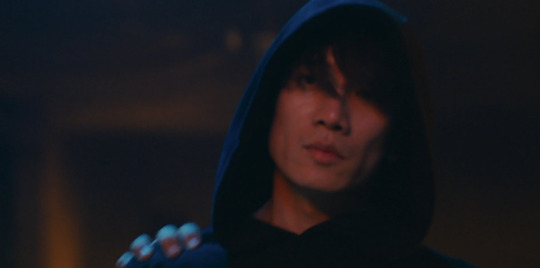

next is the scene where yohan catches gaon in his office, where he pushes him against the bookshelf and kinda, more or less, comes off as a bit luring. we know yohan knows gaon’s lying, but a couple of things here. yohan initiated the physical contact, and he did it because of the suspicious nature of gaon. yohan also knows how to use his power and charms to catch people off guard, and i think really, he was messing with gaon when he brushed his shirt and asked him if he lived alone. gay as fuck, lmao, but i also see it as an intimidation tactic, in a way.

i could also pose a couple of theories aside from intimidation if we wanted to squint:
yohan is still in a state of awe of gaon’s resemblance to isaac. he’s not heard his voice or been around the other man for at least 10 years, and now there’s tangibility at his fingertips.
if we want to look at it from the gay perspective, gaon is clearly intriguing to yohan, and as i’ll note further down in this post about yohan in relation to physical touch, i’m sure it could be assumed that this is one of the first people in a long time that yohan has an interest in making a connection with. however, because of his upbringing, it’s clear he does’t necessarily know how to connect with people (ie. ep 7 trying to connect with elijah, eps 1-6 with him trying to non-verbally tell gaon that he has bigger plans than what’s in front of his face. his admission in ep 5 about being monster). more or less, he knows his charms can be used, but when it comes to actually flirting and/or liking someone? it’s left to be addressed, but could be assumed he’s just as awkward about it as when we see him at home.
we also see a small instance of him letting someone dress him. there’s still touch involved, but it’s very clear what the intention is. he has control over the situation, and it’s not a surprise.

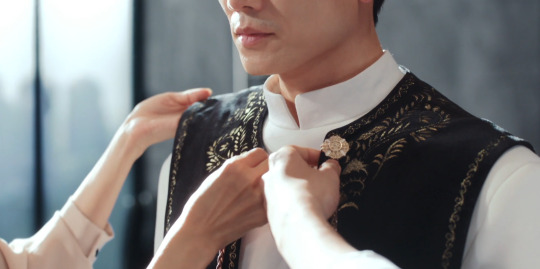
the next time he engages in physical touche, again, he initiates it because he’s in control, and it’s meant to be comforting, to an extent.
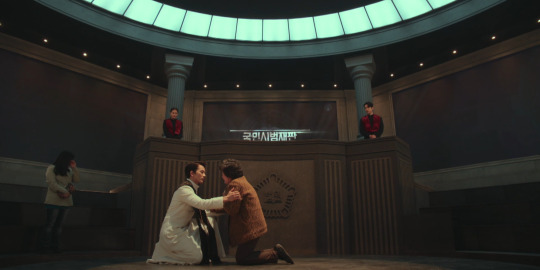
and then to round everything off, we actually see him reaching for isaac, who is actually gaon in the court scene, but you know storytelling and all that. he reaches for him both in the courtroom and within a flashback.
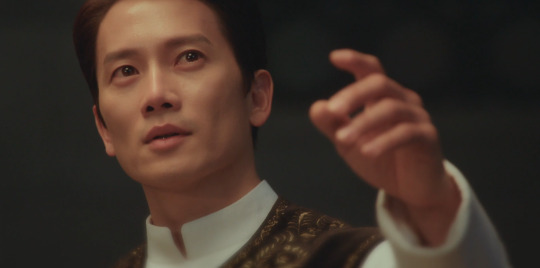
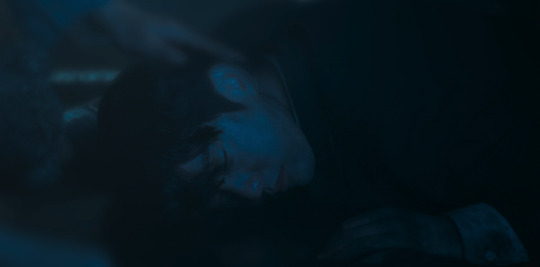
him reaching out for isaac seems to be a motif within the show as it happens later on, of which i’ll point out.
episode two
we see him initiate a handshake again. at first, to gaon, and then with jinjoo. controlled situation.
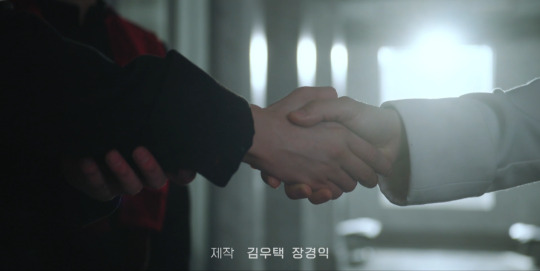
later on in the episode is when we see our first glimpses of batshit crazy yohan, an absolute delight and fav, lmao. he actually reaches out to the spoiled kid, and it’s clearly to legitimize intimidation and a position of power.
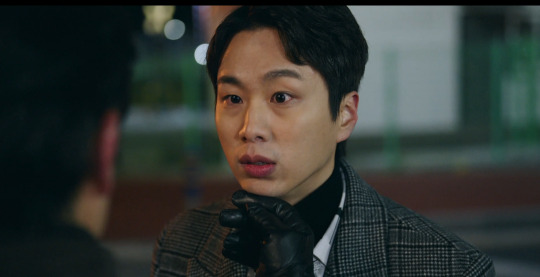
okay look, i’m not even gonna front, this was a cute scene. when jinjoo gets out of the car, he checks to make sure she’s okay, and they have this moment before they go onto the red carpet where they smile at each other. yohan is confirming she’s okay, and she agrees. again, controlled, and i don’t know for certain if yohan is more comfortable around women, or it’s just mere fact that he doesn’t always have a problem with touch when the situation is safe. he actually lets her take his arm further on in the scene, and yes, it is a public display of niceties, and he knows that.
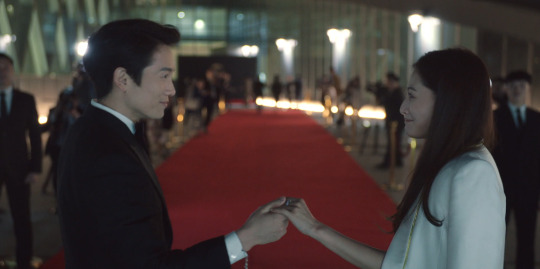
so in the midst of this happening, we get the ‘devil child’ story. and i want to make note of the bird scene because i do think it’s important to note that people yohan cares for, he’s willing to go to the ends of the earth to protect them. yes, they’re children in school, but the girl next to him is the only one who showed him an ounce of kindness, and yohan is proven to remain loyal to those he loves or trusts in some capacity.
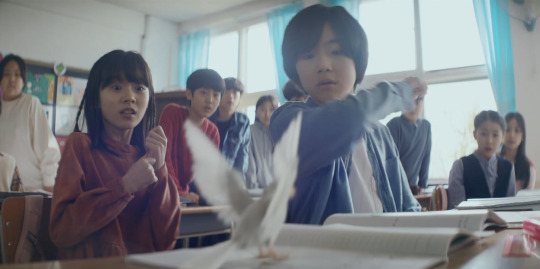
of course, he ends up pitting the rich and the poor kids against one another for their betrayal and making him an outcast. in yohan’s mind, what he did wasn’t necessarily wrong because his sense of justice is based on protection and when people wrong him or those he loves, it’s seeking justice on their behalf or making the situation better - not in the technically right way, but right to him. yohan comes across as a fixer and problem solver.
yohan has a very, very strong sense of trust and loyalty, and we can assume that stems from isaac, who clearly tried to protect yohan from his father, who went out of his way to do so as best as he could as a young kid. yohan values loyalty not because he necessarily wants lap dogs and people to do his bidding. it comes from a place of love and security he’s never really had.
anyway, back to the gala with jinjoo, he does shake the minister’s hand. again, controlled. there are cameras. he also puts his arm around her, and that’s mainly because it’s a battle of the wills, and she’s trying to reprimand him, lol, as if she could. he hugs her a little hard and a little enthusiastically, and you can clearly tell it’s for show.

and then he dances with both jinjoo and sunah. and there is a stark difference between these two scenes. yohan actually teaches jinjoo the proper placement for where she should rest her hands and how to move. he’s actually having a good time with her, and again, it’s actually really cute.
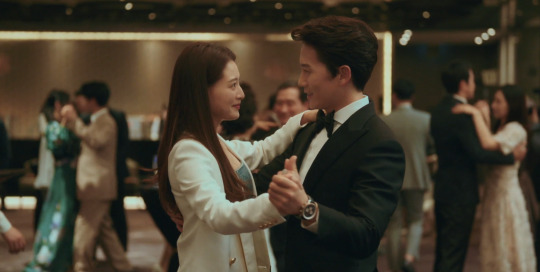
with sunah, he’s reluctant and definitely on guard. he can tell from her demeanor that her intent is with purpose trying to get close to him. at this point in the story, he probably sees it as sunah coming onto him and not because she’s actually the maid from when they were children. when sunah reaches up to whisper in his ear, you can really tell he doesn’t like her being that close to him at all especially because her words may not be overly threatening, but there is purpose behind them, which means yohan’s guards are up. he physically removes her hand and than blatantly turns her down: she tells him that enjoying things alone isn’t fun, and he counters it by saying he’s having a lot of fun.
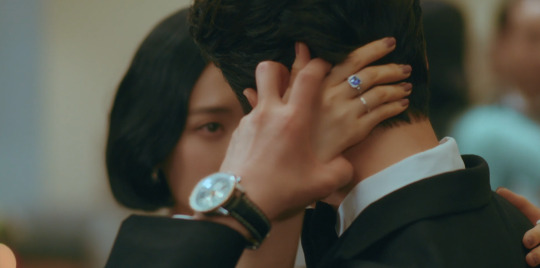
so at this point to reduce on some screen caps, he meets the minister’s family, has handshakes with her husband and the kid he went after to essentially beat up his car with a mallet, lmao. the handshake is quite funny because they both know what happened. yohan is in control, and that kid is shaking in his boots.
then the explosion happens, and of course, it makes sense that yohan helps gaon after he’s hurt. gaon has never been a threat to yohan, and it’s clear yohan’s not heartless whatsoever, but it’s also poignant to note that gaon helped saved yohan’s life, thus starting yohan’s journey of loyalty to gaon. i think he’s always had his sight set on gaon to begin with, possibly long before he even became an associate judge, but if this was a test, gaon passed it with flying colors because if gaon can rescue a little girl, and he can help an old man who fell off his bike, would he really go the lengths to save yohan who has shown him time and time again his sense of justice is different?
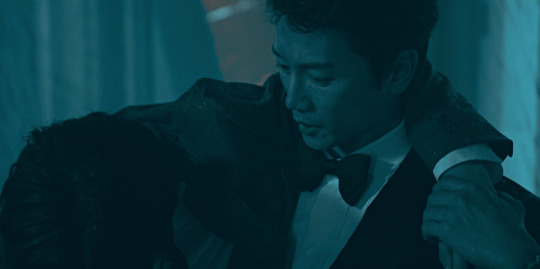
episode three
yohan reacts negatively to soohyun and within good reason when she questions where gaon is. he turns away because for him, the conversation is over, but for her, it’s not. to get his attention, she grabs him when he’s not paying attention, and of course he has a very adverse reaction. at this point, it can be chalked up to disrespect given the fact that he’s a head judge and she’s just a mere cop, but hindsight is 20/20. he does throw her arm off by flicking out his arm. but instead of berating her, he just tells her to catch the culprits who harmed gaon and leaves it at that.

and then of course, everyone’s favorite scene and rightfully so. yohan caring for gaon? very sexy of him. gaon is injured, poses no threat, and as i said above about yohan finding some amount of loyalty in gaon means his physical boundaries aren’t jeopardized. and for that, we get these wonderful scenes of yohan helping gaon as he heals.
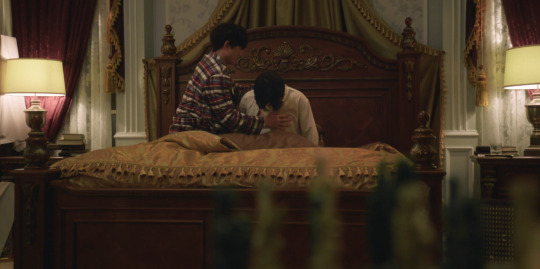
and then scenes of him messing around with gaon by hitting him. truth be told, i wonder if this was something him and isaac did as young kids. anyone with siblings know how that goes. fake picking on each other? fake bickering? yeah.
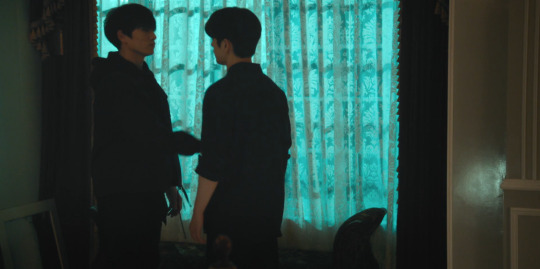
and then it slowly, but surely, it’s revealed that yohan didn’t have the same upbringing as isaac did. our first instance that something at home wasn’t right wasn’t just the conversation with ms. ji and gaon. it’s the flashback with yohan reading in his room when the door opens. he hastily pretends he’s asleep, and you can see he’s visibly shaking and breathing roughly until he realizes it’s isaac who’s there to give him books.

and that’s also when we get our first glance of what kind of abuse yohan suffered from at the hands of his father. it’s clear this isn’t the only incident, and there’s been many times that isaac wasn’t around to help defend him.

it’s also very clear in how yohan acts when he’s terrified and that his abuse has gone on long enough to be a routine pattern in the house. any time he hears heavy footsteps or thinks his father is around, he visibly shakes and gets panicky.
episode four
i include this scene because it’s been noted that a lot of books yohan reads are about humans, human nature, animals, animalistic tendencies, and he says random shit like this that directly points to what he thinks about humanity and humans themselves. we notice this most prominently at the dinner with gaon and jinjoo earlier on when he describes that he likes the feel of the chew and that he cannot taste. he always mentions hunting and prey, and i think this is one of those very clear instances where he actually reveals to gaon what he truly, truly thinks; no gimmicks. this also comes into play later on in ep 6 when elijah is worried about him being out all night. yohan clearly doesn’t trust people at all. he understands their intentions, their motives and how much pain they can cause other people for their own profit and their own gain. it makes sense that he wouldn’t leave his house, especially if he has a strong sense of loyalty to isaac (even after all these years) and caring for elijah.
this is also one of the very direct moments that yohan doesn’t understand family dynamics. when it comes to people, it’s a giant chess game. not only that, later on in the episode when they’re in the car and yohan talks about how people, no matter what, are always the same in front of greed, yohan is cynical, and he expects the bad every single time.
what he reads and the way he words things (here and the discussion of him being a monster, for example) is clearly an indication that he doesn’t trust; that he cannot trust, nor does he want to at this point. yohan doesn’t understand the concept of kindness being given freely (ep 7 when he berates elijah for being used by gaon, telling her she falls for kindness every time). and yet, later on in eps, it’s clear when he’s around the right people and the right mindset (uh, gaon?? lol), he’s constantly putting up a front.
after all in ep 7 when he tells gaon that confidence is key, it literally gives him away not just in the courtroom but in his personal life. there’s a reason he looks softer at home than when he’s not there (the hairstyle changes and clothing).
basically what i’m getting at is this behavior can be seen as a defense mechanism because of his abuse.

then it’s another gala event with gaon and yohan this time. another lovely favorite where yohan helps him get dressed and then proceeds to drag him around and safe him from the lion’s den.
tbh i dont even need to include these, but i’m doing it for the indulgence.

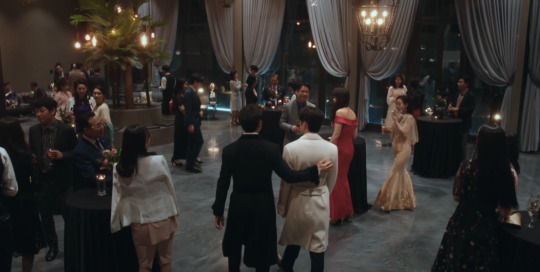
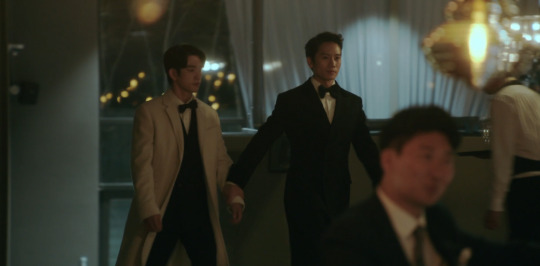
yohan does sorta physically throw gaon as well during the rich people party, but that’s mainly to get him to shut up because he’s trying to show gaon the truth at hand and how all of it’s pretty much a farce.
later on in the episode is when we first have gaon truly attacking yohan verbally, and that’s when yohan snaps. it’s clear that isaac is a trigger for yohan, especially from someone who speaks out of line on something they know nothing about. gaon, truth be told, had a stupid moment confronting yohan the way he did. i don’t know who waltzes up to a proposed murderer and just asks them, lmao.
but here’s the thing, thus far, gaon has not entirely posed a threat to yohan. whether that’s from yohan planting gaon and guiding him exactly where he wants him or gaon just not being as thorough as yohan would like, and he’s trying to tap into that talent, is anyone’s guess. but as i said above, the one thing yohan protects is the things he does care about the most, and he tries to talk himself out of his own feelings. he constantly compares himself to an animal (again, dinner scene with gaon and jinjoo) to justify his actions, and to possibly not feel anything; because that’s easier, isn’t it? not feeling. so on top of gaon calling him a monster and a killer, confronted with the possibility about being a villain in his own brother’s story, obviously sets him off. he beats down his emotions until he’s confronted with it - and this is what gaon also meant in ep 6 about how it’s ridiculous that yohan calls himself a monster over a victim because yohan can’t even see himself in that light. not because he truly believes victims are weak necessarily, but i wonder how much he realizes that what happened to him wasn’t his fault.
to me, and as i just said, yohan convinces himself he’s a monster to make it easier for himself to belief his actions (ep 5 telling gaon some humans are born monsters in relation to himself). it’s not that he inherently thinks he’s wrong, but i think his guidance for what’s right and wrong was misconstrued without a parent figure in his life, especially if he’d read crime and law books as the focus. yohan’s actions, at least quite a bit of them are, are based on a gut feeling of right and wrong. when you think about it and your own sense of justice, how would that differ without the checks and balances in place? what punishment do you think fits the crime if we weren’t bound by written law? yohan thinks any action to protect those he loves is, more or less, justifiable because it’s a means to an end. it’s making a worng right again.
i don’t think yohan is a monster. i think his feelings, and what he knows is love, is misconstrued in terms of how to express it. we see this in episode 7 with his and elijah’s conversation where she’s just trying to be a teen, but his version of love is protecting her without, once again, understanding family dynamics and the pain points of growing up, the learning she has to do on her own. yohan might technically be right; similar to being book-smart but not necessarily street smart. his theory of telling Elijah that she’s soft for kindness and being used was true, but his delivery and the idea that that’s how humans develop doesn’t work. he’s telling her text-book rules, but people don’t live through books. they live through real life. yohan reads to get a sense of fulfillment and to learn. he’s learned his way into adulthood, but that’s not normal.
so uh anyway, back to this familiar scene:
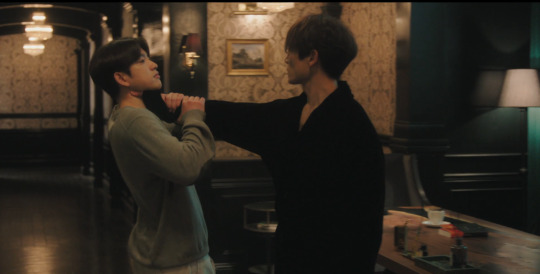
because we don’t know the actual story of isaac’s death, it’s hard to say what role yohan played in his death, but i don’t know that i believe he was the one who did it. the entirety of the devil judge is relying on unreliable narration, so it’s difficult to gauge (for now since we’re on ep 7) how this will turn out and what happened, but to me, it really comes across as yohan upset over the insinuation that he could be the one to cause the death of the one person he loved the most. plus, i think it says a lot that he cares/loves elijah, and she was part of isaac. gaon crossed a thine line. yohan essentially welcomed him in, and this is gaon toeing it. we can also look at this is not gaon being an outsider to their family, but now has become part of the family, and so it’s easier for yohan to be ‘abusive,’ if you will, rather than the perspective of gaon still on the sidelines and pushing too far. by this i mean, the accusations made by gaon threatens their formulating family dynamics.
and once again, the only person he ever actually reaches out for is isaac.
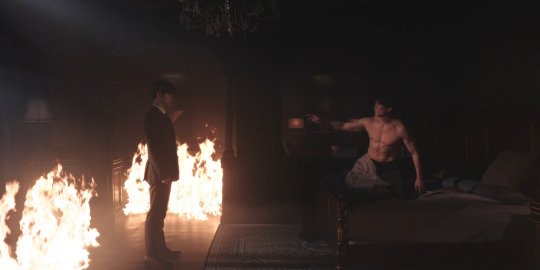
and then we have the aftermath of yohan’s nightmare, where he’s still caught in the dream as gaon comes in, and refuses to be touched after, even if gaon’s intention is to see if he’s okay. yohan makes it very clear to gaon not to touch him, and that’s when elijah comes in with a very accusatory ‘what are you two doing?’ in this moment, yohan is not just vulnerable, but he’s emotionally sensitive. i’ve no doubt he’s still dealing with a form of sensory overload from his dream.
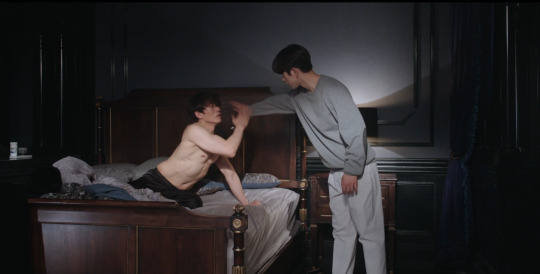
and then, i don’t know that this was necessary? was it necessary?
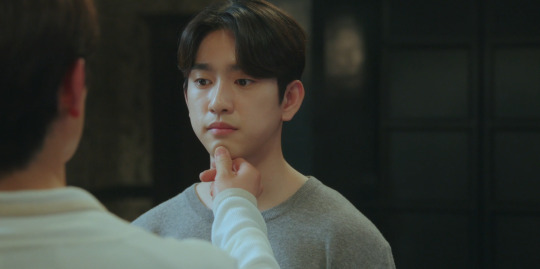
the following set of scenes are the ones where gaon tells him he’s a victim and he hasn’t confronted his own emotions about his abuse. i think yohan realizes gaon is right to some degree, but it is convoluted, and it’s not so simple to face your own traumas. however, he does for a moment after gaon leaves, remember another instance of abuse he couldn’t stop but wishes he could, wishing a parental figure of sorts would’ve come in to save him like his older self is trying to save the kid version if only he could turn back time, if only he had the power to do what he wish someone else had done for him.
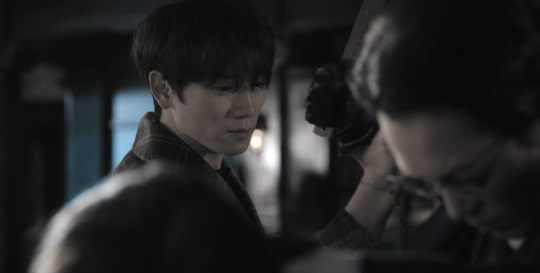
and then the kidnapping scene is just. fucked up in and of itself. it actually makes my skin crawl. not because sunah is scary necessarily, but the lack of autonomy yohan has - especially when we find out later more of sunah’s story. to do something like this after what she’s suffered through makes this scene even more disturbing.
you can see the moment yohan hears heels when sunah (not knowing it’s her yet) comes in. literally the minute he knows someone’s headed his way, he checks the fuck out. his whole face goes slack, especially when sunah reveals herself. and when she’s kissing him? blank as fuck, too. it’s the most dead-eyed stare i think we’ve seen from him.

episode six
so, we get this gem from elijah that i’d like to touch on later. it’s more speculation and just me running through ideas more than it is canon fact. but what it does let us know is that yohan doesn’t seek people out. he prefers to be at home and staying there.


after we get the maid story, and we do get yohan touching sunah’s cheek, and in some fucked up twisted way, this is his way of protecting one of the things isaac cherishes the most. the point of the gesture isn’t just intimidation but serves as an act of intent, of protection in the only way yohan knows how. he’s safeguarding isaac. you can tell he doesn’t actually like sunah at all as a kid, but uses that to his advantage. imagine yohan learning violence for ‘good’ things when his father used violence for ‘bad’ things. what a twisted way of looking at it? and the irony at hand.
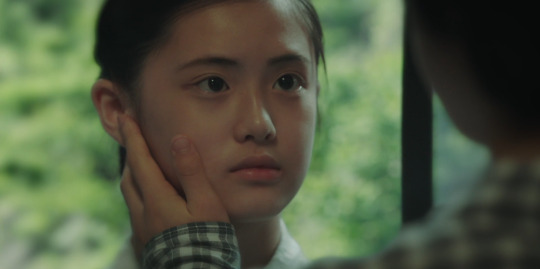
additionally, the main reason i’ve included so many varying scenes of yohan touching people isn’t to establish that he’s okay with being touched given how many scenes there are of him randomly shaking people’s hand or touching them. it’s all about context and what the intent is for. most often than not, really way more often than not, yohan only reaches out for people when it’s socially acceptable to do so and because it’s manners. and yet, even in some of those cases, there is still intent behind the gesture.
the moments he acts out the most are when he’s not in front of an audience, when he’s more likely to be alone with his thoughts and is exceptionally more vulnerable to his own triggers.
and i think the scene after he’s back at his house from the kidnapping is noteworthy because it doesn’t just feel like he’s shaking off the effects of the drugs he was given. he seems to visibly trying to compose himself of the mental and physical play he just had to deal with.
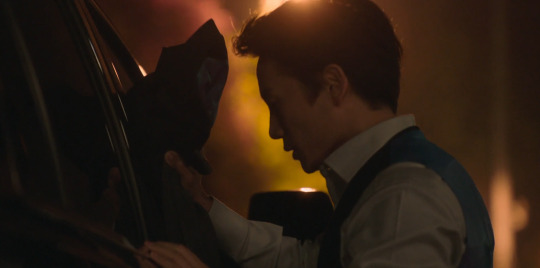
the next scene is yohan angry with gaon for taking elijah out. which really, he does have every right to be angry, and one thing i didn’t note above during the ‘you killed your brother’ choke out scene before is that when yohan is backed into any kind of corner, he reacts like a caged animal.
because we’ve already established the scenes with his abuse, his father took his anger physically out on yohan. so how else was yohan supposed have developed the tools to express it? it’s easy to hurt the things you love the most; it’s easy to abuse the ones you know, and between gaon and himself, they both have an unhealthy dynamic because gaon is old enough, strong enough to take whatever yohan gives him. gaon is not family and so there’s still that clear divide and a distinction as to why he lays a hand on gaon but not elijah, for example. gaon can still pose a threat. elijah is family. then again, it can also be said that maybe yohan considers gaon family, and gaon betrayed elijah and therefore yohan, and you don’t do that. not with yohan’s understanding of family dynamics.
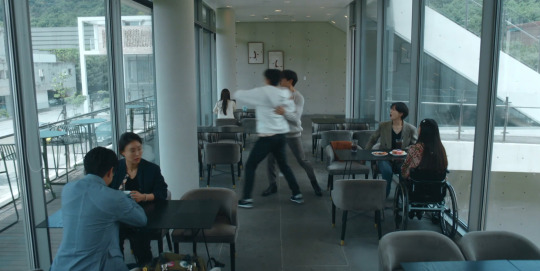
but with that said, it begs the question why yohan keeps gaon around, and i think some of that has to do with the fact that gaon surprises yohan. he might’ve set his sights on him long before he became an associate judge or maybe he took interest after gaon was chosen for the role (this is still up in the air), but deep down, yohan sees something in gaon despite his snooping, despite his righteousness. it could be the potential; it could be the fact that gaon could be better than yohan if he just allowed himself to loosen the ropes he’s tied himself with when it comes to the court of law and the justice system.
but here’s the thing that idk a lot of people have really picked up on. gaon is one side of the same coin underneath it all. he’s also provoked yohan with physicality when yohan brought up details about soohyun.

to be fair, we can say that yohan evokes a different type of anger in gaon, one that he hasn’t tapped into for years that allows him to open up to that more physical side of himself he learned to put behind him. gaon doesn’t really come across as the physically threatening type, but yohan does push his buttons and vice versa.
but then, of course, we have the big fight scene where gaon goes in on the attack, and that’s when yohan makes his threat not to attack him ever again. it’d be easy to say he says it based on the merit of him not actually attacking soohyun, but seriously speaking, the intent feels much more than that. more along the lines of asking gaon not to provoke him without warning again because next time might be bad. most of their other fights, especially the one above,have been in the midst of conversation. this time, it’s from a place of complete surprise, and you can tell yohan goes on the defensive when his first instinct is to not just throw gaon back but raise his fist to strike.

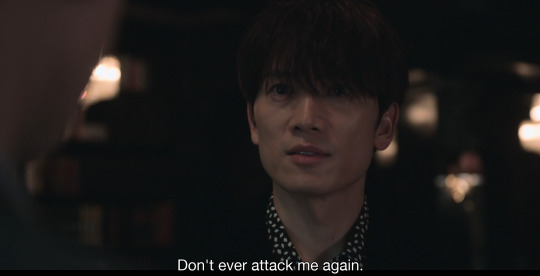
episode seven
the only physical contact yohan has with anyone is the president, and that’s when he turns on the live video of the two of them, and it’s clearly intended to be a lowkey threat. he keeps pulling the president back into his side to be on the live camera after the dude tried to come after yohan. i do think it’s hilarious that yohan manipulated the situation with a live component just as the president and the rest of the rich people thought they could turn a live court show into manipulating the public.
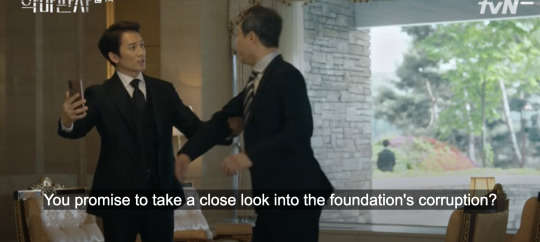
and then, of course, the jail scene. the part where he makes gaon stay. he also touches gaon’s shoulder later just before they leave.

episode eight
the most prominent scene in this ep is certainly the scene where sunah comes onto yohan, and you can tell she did it to get under his skin in some way. of course, he’s smart and knows she’s up to something, but i think it’s so interesting how he wraps his fists around hers, almost as if to tame her and prevent her from trying to further put her hands on him.
we also know yohan has no issue with using physical force regardless of who it is (obviously, his dialogue in this scene, too) when he feels caged or trapped. his intention is also to retrieve isaac’s necklace, and i like how he uses literally anything to his advantage. meaning, he’ll use physical touch, his mentality, etc to get what he wants or needs, even if it is marginally uncomfortable to some degree.
and i think that also says alot about him is that he’s able to displace what makes him uncomfortable in moments like this to achieve an end goal.
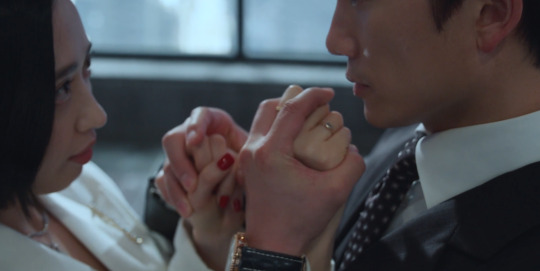
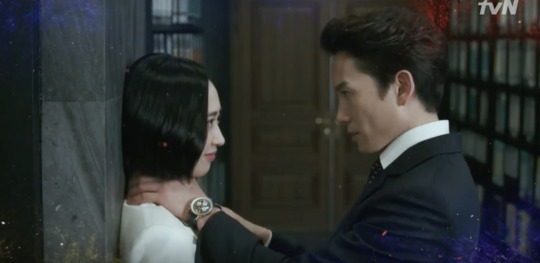
additional thoughts
i know this isn’t really common with a lot of the characters in general, and could be chalked up to a cultural component, but yohan’s definitely not a hugger.
the other thing i wanted to note is yohan’s seemingly adherence to touch unless it’s for good reason in relation to sex. the main reason i bring it up is because i’ve seen it discussed a bit, especially in regard to elijah’s comment about him not staying out overnight since the fire. there are a few plausible scenarios, maybe more, but for the sake of this, we’ll go for these.
yohan has had past relationships/experience or will in future episodes
day flings
he’s never had an interest in anyone before given his upbringing and abuse and therefore never sought out sex
inexperience could be from lack of interest in other people and sex itself
he’s never found anyone to really connect with and trust in such a way and has avoided it for that reason
and i bring this up mainly because i think it could be something to explore in fanon, but also because i’m kind of annoyed with how people have been talking about yohan being a virgin. i’m not quite sure what the joke is, but lack of sexual experience does not mean naive or that he doesn’t have a sense of humor when that’s clearly far from the truth:
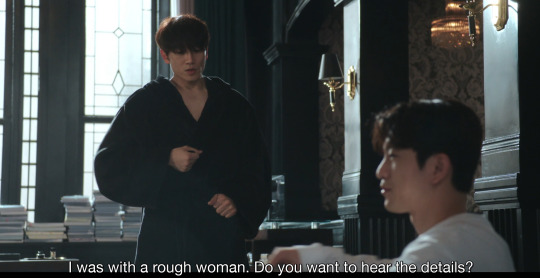
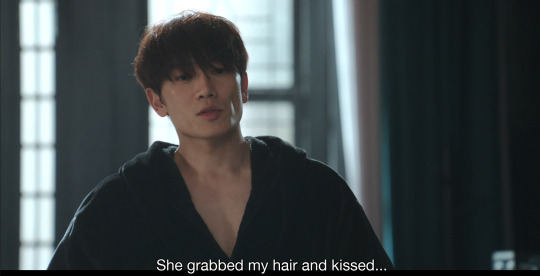
i don’t know that people find it unbelievable because of his age, because of characterization of yohan being more dominant, but none of these things negate this being an option. i think it’s perfectly plausible of a situation (from what we know right now), and truthfully, it would make a whole lot of sense. i just don’t get the jokes about it that i’ve been seeing online (twitter) when there isn’t a mutual exclusiveness to any of it whatsoever.
yohan already has a hard time connecting with people, and i can imagine that level of physicality could be difficult. clearly he knows how to use a version of it to get what he wants. i’ve no doubt he’s used his charms in situations where he’s needed to. yohan knows he has that going for him, at the very least. but sexual appeal and jokes doesn’t mean having a body count any more than it could indicate there being one.
lastly, i also want to pull these paragraphs from @b612sunsets‘s post because i think they do a much better job than i ever could of explaining, short and sweet, a fundamental part of yohan’s characterization, and mainly what i was trying to get at with this long ass post.
“There's two things we already know about Yohan from the last 6 episodes: he hates being touched when he doesn't see it coming and doesn't have control over it because of the abuse he suffered (I assume). To name a few: Soohyun grabbing his elbow to stop him from leaving and get answers about Gaon, the beggar that touched him while he searched for the fireman, Gaon after punching him and Yohan clearly telling him to NEVER do it again. The impression it gave to us is that if there's a next time he might not be able to stop his instinctive reaction of defending himself and using violence back (something worse than choking or pushing Gaon and he doesn't want to do that with him).
“Unless it's a friendly/small/slow touch like in the breakfast scene when Gaon touches his arm when he gets up to offer them some fruits. When he had the nightmare with Isaac, his walls were up high so even if he could see Gaon's touch coming and it was friendly, he decided to stop it because he was too defensive and sensible to accept the gesture (it would be the first time Gaon started physical contact with him too, he wouldn't be ready for that in such a state).
“The second thing is that Yohan hates when people take what is his or mess with what is important to him. Again, to name a few: Sunah with the necklace when she was a maid, the fireman with Isaac's watch (Yohan made them fall from high places, not caring if they died or not), the guy that fabricated the small bombs that hurt Gaon (Yohan would have burnt his face if "K" hadn't stopped him) and Gaon taking Elijah out of the house to Soohyun without previous notice (a cop and someone he doesn't trust).”
yohan has a very, very large sense of self-preservation for himself and for those he cares about. it’s in his intention, actions, facial expressions, movements, the way he interacts with people. i find it fascinating how calculating he can be, but at home, he’s at his most vulnerable and almost socially unaware and awkward.
yohan is a bit of an irony. he understands people from an action-oriented, instinctual level, but he doesn’t necessarily understand their thoughts and emotions in the waves of nuances that people live through on the daily. like, he gets it to an extent and on a practical level, but he himself is a square trying to fit into a circle - he doesn’t always understand it for himself and has to actively work on social cues so as not to come across as the devil child he was once painted to be.
and let it not be unsaid, yohan really will go to the ends of the earth for family, even if it means stepping out of his comfort zone.
and so anyway, i doubt this offered any real insight, but i think this is my way of breaking all of this down for myself. so, tada!!! lmao
107 notes
·
View notes